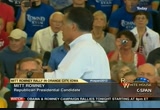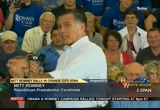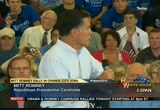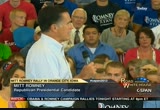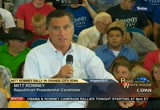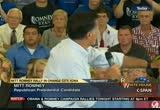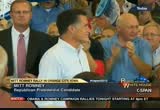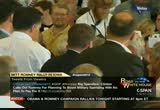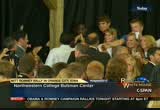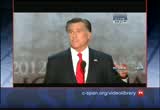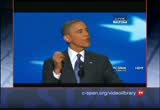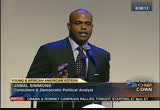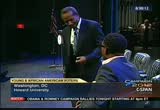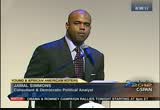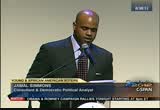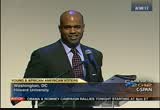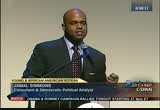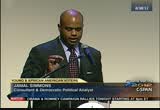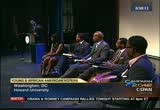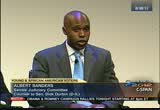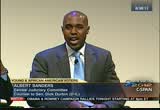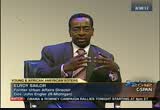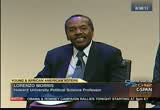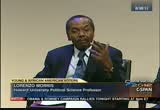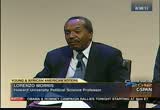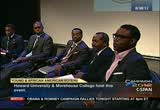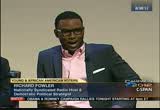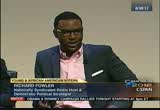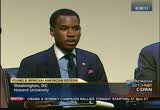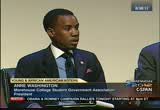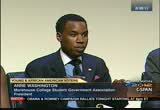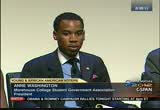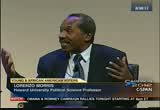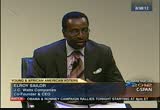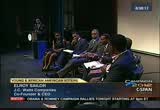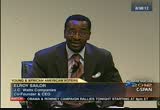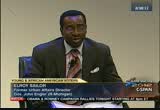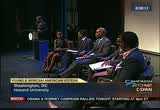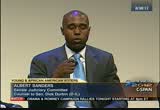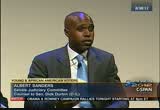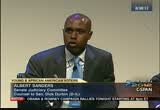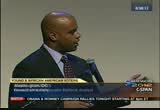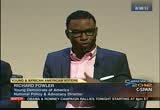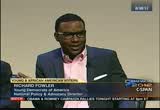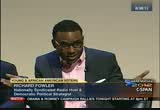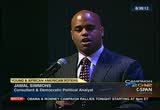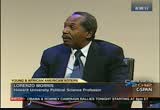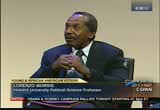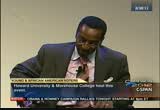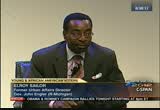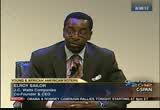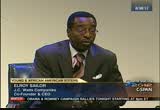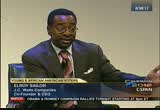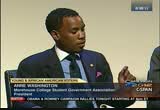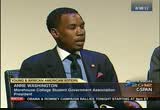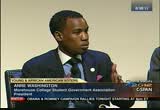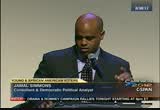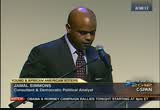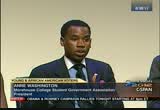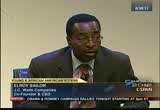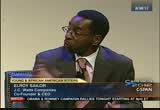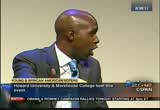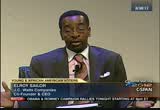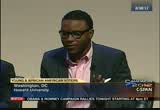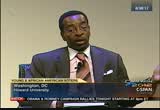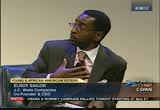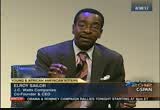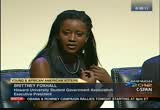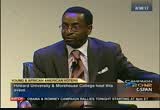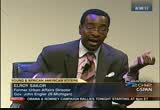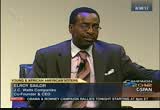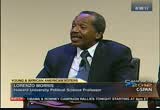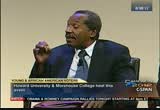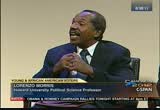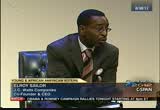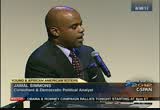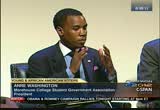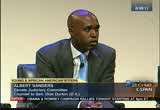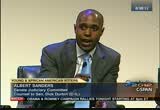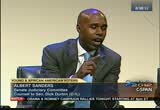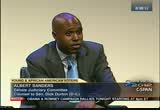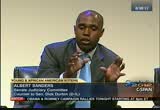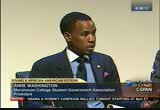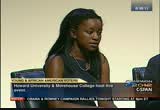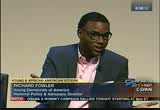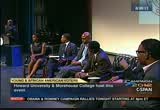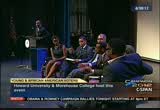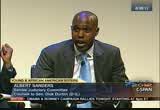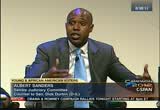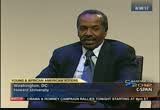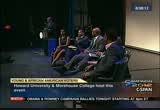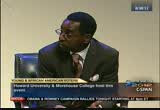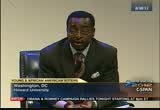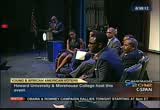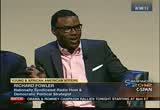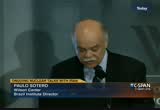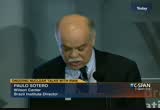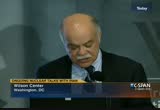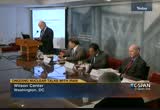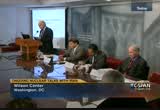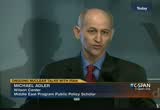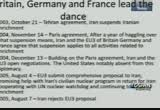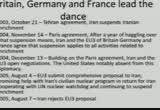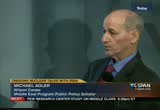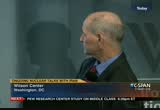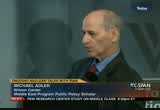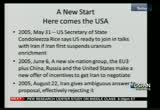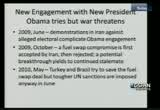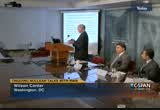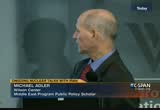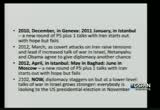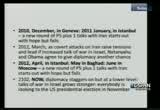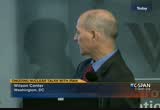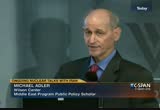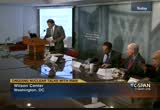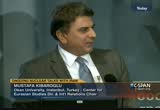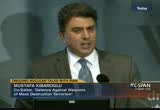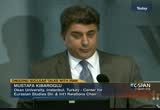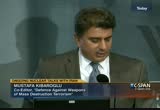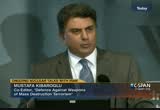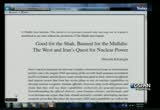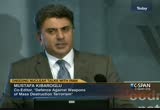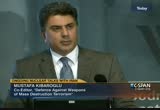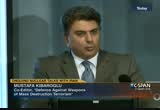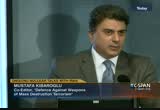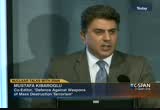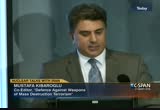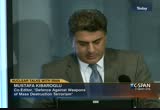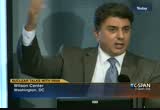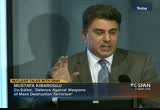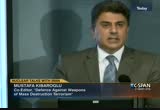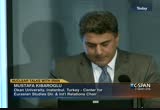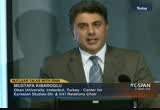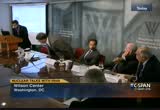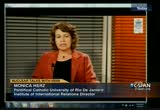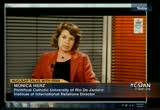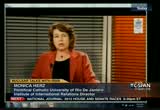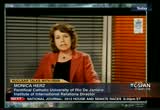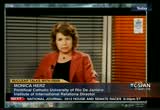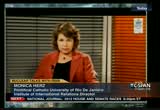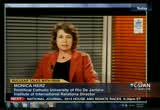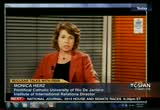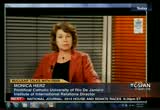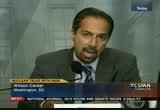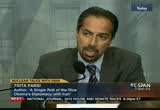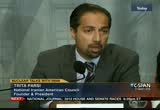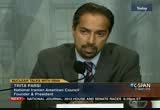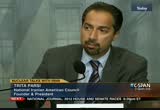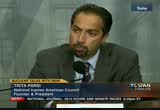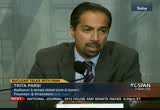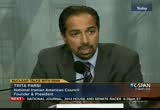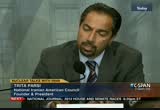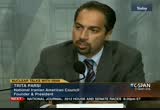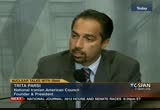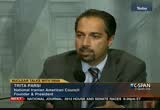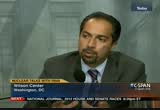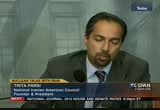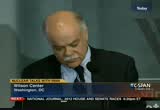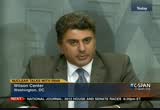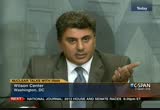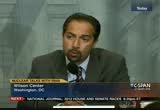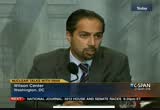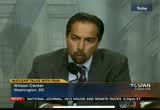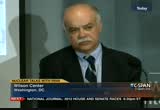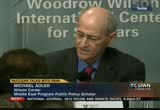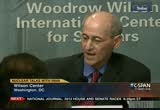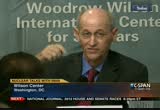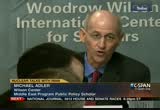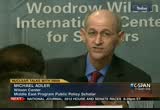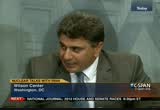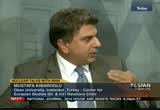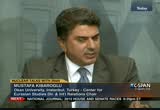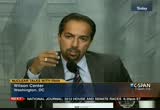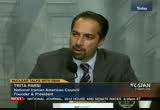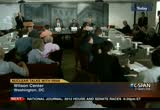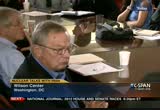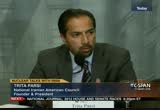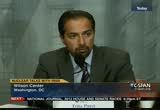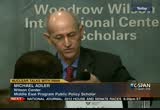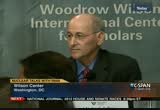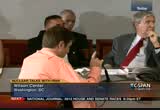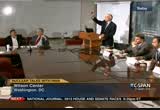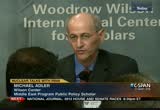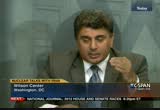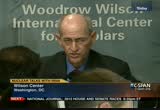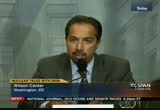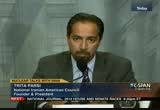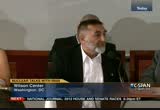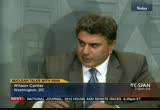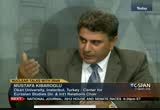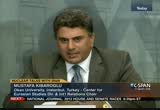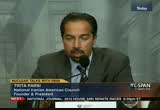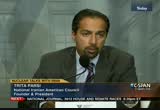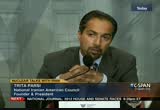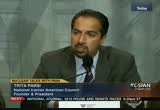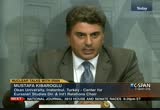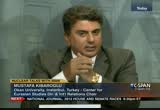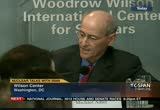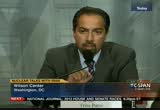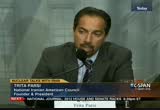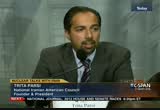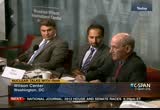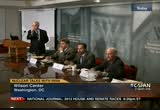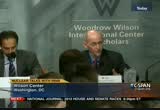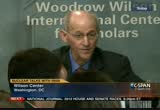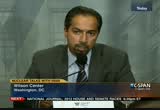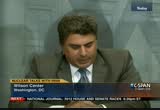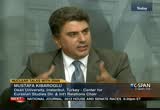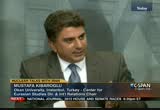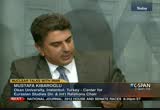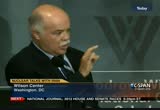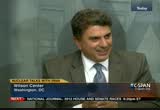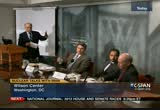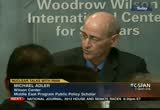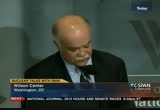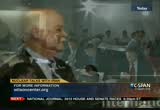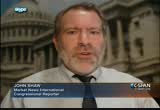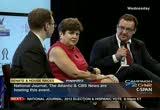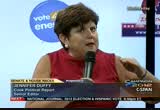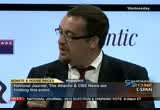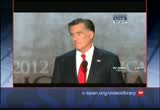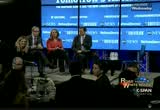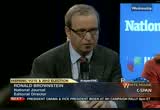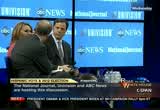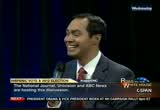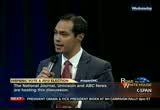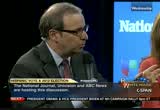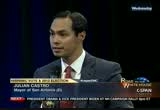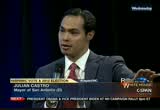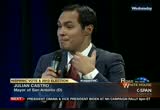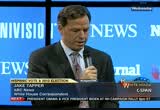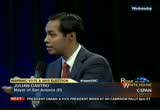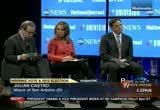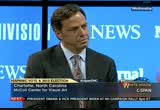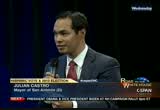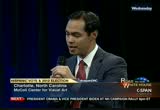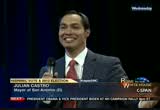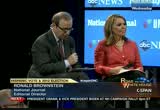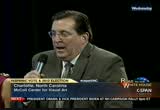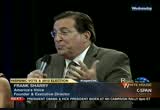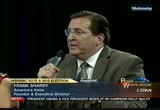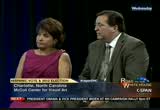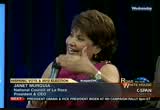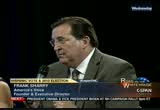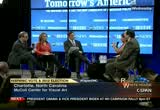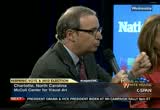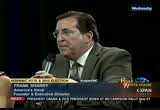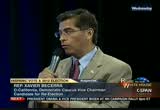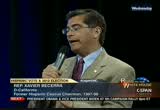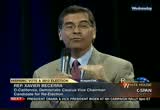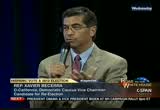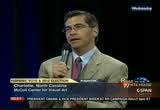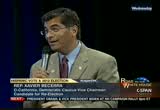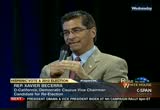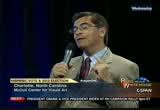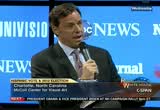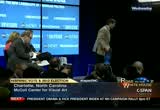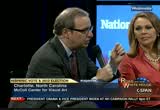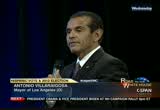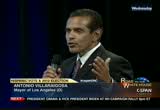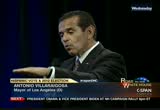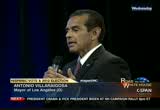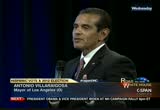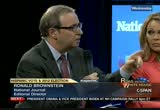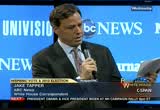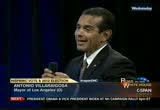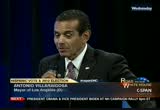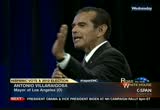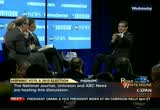tv Politics Public Policy Today CSPAN September 7, 2012 2:00pm-8:00pm EDT
2:00 pm
iowa to trade. this president is the first since roosevelt, fdr, not to seek and receive trade promotion authority to be able to work out new trade deals with other nations. i will fight for the capacity to create new trade opportunities. because i spent my life in the private sector, 25 years, i understand what kind of late -- what kind of deals are good for america and which are not. by the way -- if nations we trade with decide to take advantage of us unfairly and cheat, there will be consequences. i will finally do what needs to be done to make sure china does not take our jobs.
2:01 pm
2:02 pm
as you know, i was one of those that helped finance the very first staples store. i remember going to the store the night it opened and talking to various folks that were putting products on the shelf. we wondered what would happen when people came to our store or not and i remember talking to one of the founders and i said what do we do if no one comes. he said nazi easy, lower prices and advertise some more. i said what if they still don't come and he said that's easy, lower prices and advertise more. so that one store in brie ton, massachusetts, has now grown to be hundreds, thousands of doors worldwide with distribution centers here and all over the country. it's a remarkable story. it's the story of america, how individuals pursuing their dreams in fact built it themselves and -- [applause] >> and by virtue of their dreams
2:03 pm
and a great nation, the welcome streamers, and the support of all the people that work in an enterprise like staples, they were able to create a business which employs about 90,000 americans today. so i know that to get americans back to work and to create the 12 million jobs i've dedicated to creating, i have to create the conditions and the environment that encourages entrepreneurs and innovators and small business people to start businesses and to grow them. and for that to happen, there are a couple things i've got to do. one i want them to know that if they're successful, if they're one of the very few of the startups that actually makes it, that they'll be able to keep a good deal of their own profits, their own earnings, and be able to plow it in to the business to grow, because if you raise taxes on small business, a lot of them won't even start and those that do, won't be able to grow, so for me holding down taxes on small business is essential. and number two, i want regulators to know their job,
2:04 pm
yes, is to catch the bad guys. there will always be bad guys out there. you have to catch them. but you also have to recognize that your job is to encourage the good guys, regulators and regulations have to encourage small business, make it easier to grow, get behind our enterprises. and then if you rolery want to help small -- really want to help small business, you have to take that cloud off of them, that cloud that's keeping so many small businesses from adding employment. the chamber of commerce carried out a survey, they asked businesses all over america, what's the impact of a particular piece of legislation and people came back, 75% of the people surveyed said, that piece of legislation keeps us from hiring people. that legislation we have to get rid of is known as obama care and i'm going to get rid of it. [applause]
2:05 pm
now that doesn't mean that we're not going to make improvement to our health kay system. we know that health care is too expensive. obama care doesn't make it less expensive. when the president ran for office, he said he would cut premiums by $2,500 per family. obama care pas is up $2,500 a family. that's a $5,000 difference and for median family in america of $50,000 about, that $5,000 is a huge impact. has a huge impact. i'm going to go after getting the cost of health care to get reined in and by the way, i'm going to do that by taking on malpractice, i'll do that by letting individuals be able to buy their own insurance. without just getting it from their company.
2:06 pm
and of course, in health care, we have to make sure that people who have preexisting conditions are able to get insured and that folks that get sick don't get dropped by their insurance company. a lot of things that we can do to improve, but we don't have to have obama care that raises taxes. we don't have to have obama care that cuts medicare by $716 billion. we're going to get rid of obama care, restore funding to medicare and keep the promises we made to our seniors. i have to tell you, i'm excited about what i see ahead. i'm absolutely convinced the american people are going to take a good careful look at both people running for president, and they're going to ask themselves, what do i want going forward? do i want a president that's going to continue the policies that he put in place over the last four years, that led to record levels of unemployment, what now, 43 straight months
2:07 pm
above 8%. did you see the jobs report this morning by the way? 95,000, i believe, net new jobs created and almost 400,000 people dropped out of the workforce altogether. it's simply unimaginable. the president said that by this time, we'd be in 5.4% unemployment. 5.4%. instead we're at about hate%. and you know the difference that that makes and how many people would be working in america? nine million people. had he been able to keep his promise, had his policies worked, as he thought they would, there would be nine million more americans working. if that had been the case, we'd have a lot better budget setting, we'd have a lot better family life in this country where people are struggling to make ends meet. we wouldn't have many kids wondering whether when they get home at night, mom and dad will be there, because with two jobs, trying to make ends meet, they can't be there. wouldn't have as many seniors wondering whether they're going to be able to put food on the table at the end of the week.
2:08 pm
we wouldn't have as many young people wondering whether they can afford college next semester. wouldn't have as many college graduates asking themself, can i possibly find a job when half today of our college graduates can't find work or work consistent with a college degree. look, this is important. nine million people. this president tried, but he didn't understand what it takes to make our economy work. i do. i will use that experience to get americans to work again. [applause] >> at the democratic convention, they had that video that said that we all belong to the government. boy, they sure got that one wrong, didn't they? the government belongs to us. and we -- [applause] >> and we value the government we have. and we pay for it too. it ain't free. and we want that government to
2:09 pm
encourage and protect our freedoms. to honor its promises. to create the conditions that make it easier for small businesses and entrepreneurs and innovators and students coming out of school to be able to begin their life. that's what i'm dedicated to doing. i love this country. i love the principles upon which it was founded. i don't want to transform america into europe. i don't want a bigger and bigger government,, more and more intrusive, telling us how to live our lives. i instead want a government which encourages individual initiative and freedom. i will be a president who will never say to you, you didn't build it. if you get the honor roll i'll congratulate you, not the bus driver that got you to school. i brief in individual achievement -- believe in individual achievement. [applause] >> now one more thing i want to say to you that are going to college here. you've got friends that are going to college here and around iowa and around the country. and you're going to have a big
2:10 pm
say. you may even have the deciding say as to who the next president is. and i know that the president and his party are going to do everything in their power to convince you to vote for them, but i want you to ask this question. who is dedicated to making sure we don't pass on trillion dollars of debt to you? i am. my party is. we're absolutely committed to making sure you're able to live the american dream. the other party will promise you lots of free stuff, but then ask them how are they paying for it and they say oh, we're borrowing money from china to do that and guess who is going to pay the interest on that? guess who is going to pay the interest on that, guess who is going to pay it back all their lives. you are. i see a sign up there, $16 trillion in debt. thanks for making that. thanks for rear minding it's. governor -- reminding us. governor branson and i won't be paying that, we'll be gone when they're paying for that. you guys are going to pay for that. you're going to pay the interest on it and it's going to get
2:11 pm
larger and larger until that interest swamps our total defense budget, that's what's going to ham unless we get serious about reigning in the excesses of government. the president's answer, we all respect our government, but we don't want it to get so big that it crushes the dreams of the american people and i will night for the young people of america by getting us finally on track to a balanced budget. you guys, we're going to win this thing. this day, we're stepping forward, we're taking back america, we're going to make sure that america remains the hope of the earth. we're going to keep america the shining city on the hill ronald reagan spoke of. i love this country, i love the people of america, i believe in the people of america, and we're going to take back america and keep it strong. thank you so very much. thank you.
2:13 pm
♪ in our country, that's what i say ♪ ♪ it's going to be better, that's for sure, if it's made by my neighbor next door ♪ ♪ yeah, i want my label to say made in the u.s.a. ♪ ♪ two american jobs built their little dream home ♪ . ♪ now there's a foreclosure sign because the factory is gone ♪ ♪ their friends are soldiers, they're off to war ♪
2:14 pm
2:15 pm
2:16 pm
♪ we'll build the best damn car ♪ ♪ working with you, you working with me ♪ ♪ i want my jobs today in our country that's what i say ♪ ♪ i just want to be better, that's for sure, it's still made by the neighbor next door ♪ ♪ hey i want my label to say made in the u.s.a. ♪ ♪ u.s.a. ♪ american jobs in the u.s.a. ♪ american jobs in the u.s.a.
2:23 pm
>> the presidential candidates visiting new hampshire and iowa today. mitt romney here in orange city, iowa. earlier, we saw president obama in portsmouth and we'll show both of their rallies generally tonight starting the 8:00 p.m. here on c-span and just to get you know, republican vice-presidential candidate paul ryan is in nevada, and we'll show that later as well. the presidential candidates' plans for september 11 are shaping up. president obama and the first lady will gather on the south lawn of the white house to commemorate the anniversary of september 11th, with a moment of silence. then on to the pents memorial and a visit to walter reid hospital to speak to wounded soldiers there. mitt romney is going to be in nevada for september 11.
2:24 pm
he'll be speaking to national guard officers in reno. now a look -- [applause] >> america has been patient, americans have supported this president in good faith. but today, the time has come to turn the page. today, the time has come for us to put the disappointments of the last four years behind us, to put aside the divisiveness and the recriminations, to forget about what might have been and a look ahead to what can be. now is the time to restore the promise of america. [applause] >> many americans have given up on this president, but they haven't ever thought about giving up. not on themselves. not on each other. and not on america. what is needed in our country today is not complicated or profound. doesn't take a special government commission to tell us what america needs. what america needs is jobs, lots
2:25 pm
of jobs. [applause] >> note this, america. our problems can be solved. our challenges can be met. the path we offer may be harder, but it leads to a better place, and i'm asking you to choose that future. i'm asking you to rally. around a set of goals for your country. goals in manufacturing, energy, education, national security, and the deficit. to new jobs.le plans that will more opportunity. and rebuild this economy on a stronger foundation. that's what we can do in the next four years, and that is why i am running for a second term as president of the united states. >> find any speech from both the democratic and republican conventions online at the c-span video library. >> during the republican and democratic conventions, we're
2:26 pm
asking middle and high school students to send a message to the president, as part of this year's c-span student cam video documentary competition. in a short video, students will answer the question, what's the most important issue the president should consider in 2013? for a chance to win the grand prize of $5,000, and there's $50,000 in total prizes available. c-span's student cam video competition is open to students grade 6-12. for complete details and rules, go online to student cam.org. >> i want c-span, c-span2 and the books portion of c-span, because i feel it's important to be knowledgeable about what's going on in the world, and i feel that c-span gives the most information about what's going on in specific subjects, where a lot of television doesn't do that. >> hillary pate watches c-span on comcast. c-span, created by america's
2:27 pm
cable companies in 1979, brought to you as a public service by your television provider. >> now a look at the youth vote. howard university and moore house college hosted a discussion recently with speakers representing republican and democratic points of view. the panel explored how social issues, like gay marriage and abortion might affect the youth vote, as well as the african-american vote. they that you could about new state laws requiring voter i.d., restricting early voting, and changing voter registration requirements. this is about an hour and 45 minutes. >> good afternoon everybody. good afternoon everybody. thank you, thank you, thank you. i feel like i'm about to announce the starting five, the starting rhineup for the team. we have a good group of people back stage and i want too bring each one of them out with a
2:28 pm
little bit of background about who they are and then before we get started, i'll make a couple of remarks and then we'll get some questions and some statements from them, some questions from up here, and then hopefully, you will be completely stimulated and excited and engaged and you will get up and ask a couple questions of our panelists also. so that we can have a very good discussion, because frankly what we're here to talk about is you. we're talking about the generation that is going to be making the decisions that will last for the next couple of generations and we want you to be involved in this conversation. so the first person i'm going to bring out is the host of radio's nationally syndicated richard fowler show, richard to you letter is an advocate for youth and the advocacy director for the young democrats of america. fowler has been featured as a commentator on fox news, msnbc, a variety of international stations, and he hosts a radio program that we mentioned, the richard fowler show.
2:29 pm
he's also a delegate to the 2012 democratic national convention. so we'll be seeing him in charlotte next week. richard fowler, welcome. [applause] our next panelist is lorenzo morris. dr. morris is professor and former chair of political science here at howard university. he recently held the fulbright distinguished chair at the university of paris. he's an author an consultant on black politic, international and american public policy, and has taught previously at m.i.t. a research fellow at the brookings institute and he has worked as a television and radio commentator on politics in western europe, canada, all over west africa, the united states, and he was born in new york, phi beta kappa graduate from yale. next, we're going to bring out an old friend of mine, i use old
2:30 pm
purposefully, because both of us are now old. he will roy sailor. he will roy is co-founder and chief executive officer of the j.c. watts company. a multiindustry business headquartered in washington, d.c., with operations in oklahoma, texas and nigeria, as a c.e.o., elroy manages and operates watts partners, the largest african owned lobbying firm, formed by former congressman j.c. watts. prior to finding the watts company, elroy worked for governor john engler of michigan. he, like me, is from detroit michigan and is a graduate of moorehouse college. thank you, elroy. [applause] >> next, albert sanders jr. come on down. albert sanders jr. is counsel to
2:31 pm
the united states committee on the judiciary. he's a principal legal and policies adviser, the assistant majority leader to senator deck durbin from illinois, chairs the committee on constitution, civil rights and human rights. he offers counsel on issues ranking from privacy, finances reform and he was named to the luke's 21 under 40 list. mr. sanders earned his become a. in political science from moorehouse college in 2001, there after, completed a certificate at wharton business school, while getting his law degree from the university of pennsylvania, where he was president of the path in 2004. he's a member of the state bar of california and the district of columbia bar. [applause] >> andre d. washington, senior sociology major from hinesville, georgia, who currently serves as the 81st student association
2:32 pm
government president for moorehouse college. washington is a passionate advocate for the brothers at moorehouse college and all students. one of his goals as sga president is achieving 100% voter registration on the college campus. he also has been focused on increasing student safety by voting partnerships with the atlanta city council and the atlanta police department. andre, thank you for being here. [applause] >> and since we decided we couldn't have a panel entirely full of men, as you all will no, sir, we're a little heavy on the testosterone, we are going to bring up next, she's coming up last, she is certainly not least, she is your student government president here at howard, brittany foxall. [applause] brittany is a junior international business major from detroit, michigan. a lot of detroit up here. i like that.
2:33 pm
she has been actively involved in numerous leadership organizations on and off campus, as a sophomore, served as team leader for the 21ering century program and became active it the howard university student association. she also represented howard on the dc-musa council, comprised of student leaders from the metropolitan area the last summer, brittany interned for johnson & johnson corporation in brunswick, new jersey and plans to enlist on the pace corpse after graduation to work on business development in underdeveloped nations. welcome brittany. so, thank you all for being here and thank you, panel are fog here. i want to make a couple of remarks as we get started. i have been doing this now -- working in politics for 20 years and i started when i was sitting at moorehouse college in a group just like this.
2:34 pm
i was sitting on campus when bill clinton came during the georgia primary in 1992 and someone handed me a flyer and they said, governor of arkansas is going to be in the king chapel, you should go listen. i didn't have anything to do so i went and listened to him. i didn't think i was going to like him, but i sat there at the time he was this new democrat, sort of conservative, and you know, we thought maybe he was a republican in democrats' clothing. people don't remember when bill clinton was a conservative governor, but i sat there and listened to him and he talked about all the things that were important to me. 1992, we were in the middle of a recession and he was talking about getting the economy moving. in 1992, he was talking aboutple grants and student loans and making sure that the people had health care and all these things that somebody who was on the verge of leaving college and going out into the world, i thought was going to be hugely important. and what we've seen over the course of the last 20 years is the incredible growing influence of the younger generation in picking presidents.
2:35 pm
and when you think about what happened in the last election, 2008,, in 2008, president obama, there were 130 million votes cast. and the coalition that president obama put together was african-americans, latinos, women, and young people. and let's just look at the age demographic numbers to start in particular. in 2008, 10% of the electorate was between the ages of 18 and 24. 16% of the electric rate was 65 and older. in the last election, 2010, when republicans were able to recapture the house, and members of the resounding republican victory, there was 6% of the electric rate was 10-24. it was 6% in 2010. and 21% of the electorate was over the age of section 5. -- 65. when young people vote, they get to choose the leader that they
2:36 pm
want. when they don't vote, they have leaders chosen for them. so there are election is going to really hinge on the turnout of this generation. and people may decide they don't really want president obama anymore. but you should make that decision and not let other people make it for you. so with that, i am going to go to our panel, and since she was last, we're going to ask her to speak first, and then we'll work our way around the panel, with just a couple of minutes of opening remarks from each one of you before we get to questions. >> hello again everyone. my name is brittany, i'm a senior international business major from detroit, michigan, currently serving as your executive president here at howard university and you know, i really thought it was important that my voice was heard today, because as you all know, this is a very important pivotal election year and we each play such a big role in what's going to happen and i just think being engaged and being a part of the selection is
2:37 pm
so much more than just going out and voting. as howard university students, we are the premiere university for african-americans. and we're developing the leaders of tomorrow andals the leaders of -- and as the leaders of tomorrow, we should make informed decisions so we should know the platform of the republican party, we should know the platform of the democratic party so we can make these informed decisions and have informed conversations with our peers and know what it is we're speaking about and know what it is we're voting for, so that's what i want it push for and speak about today. >> thank you. >> good afternoon everyone. my name is andre washington, i'm the 81st sga president of moorehouse college, special shoutout to spellman ladies that are presents, to our sisters over there. essentially, i want to implore everyone in this auditorium and everyone that may see this reporting that essentially, we have to be engaged. 2012 is a critical election. since the time of president obama's election, there have been several laws and actions
2:38 pm
taken to suppress this voice in this room of african-american youth, african-americans in general, the elderly, those who change elections. we are here to send a resounding message that you may try to suppress this voice, but we will be heard. >> all right the. >> good afternoon everyone. my name is albert sanders, i am counsel on the senate judiciary committee for the chairman of the subcommittee on the constitution, senator dick durbin, and i'm very happy for here today behind enemy lines once again. at moorehouse, but we have a great welcome and looking forward to talking told. i know that jamal will leadens that direction that we'll talk a little bit about why it's important to vote. there are some people, probably some young people, though not any in this room, who may be thinking, well, why is it important for me to vote? may be thinking, well, you know, my vote really doesn't matter that much. well, i'll start by leaving you with this thought. that is that there are plenty of
2:39 pm
million hairs and billionaires who are contributing to super p.a.c.'s and many nationally known political strategists that are trying to do everything they can to make it harder for people like those gathered in this room to vote. our committee has done an extensive set of hearings across the country and what they indicate is that it's harder for young people, minorities, seniors, disabled folks, poor people to vote as a result of laws that are being passed across the country, so if you don't think your vote matters and if young people across the country don't think their vote matters, all you have to do is look at what some folks in the opposition are doing, and we'll talk a little bit more about that today. >> good afternoon. thank you for having me here. i'm going to say thanks to president of moorehouse college and president of the university to hosting this forum. i am a father, husband, friend as many people as i can try to be a friend to and over the last, say, 20 years or so, i've had some unique blessings.
2:40 pm
eve had an opportunity to see politics up close and personal, serving at the executive level on the state level and serving at the legislative branch on the federal level. so hopefully, this afternoon, i can share a little bit of my experiences with you all, and most importantly, you know, now that i am -- i have been out of politics for almost 10 years, it's a different job. with you're in politics, your job is more to market. you have a product, you have a candidate, you have a group of ideas and policies and you market those to a constituency to try to move them from point a to point b. now that i'm out of politician, i don't necessarily see that as my job anymore, so i have a lot more fun with it, in terms of i want to educate and try to say with you all my experiences, as i've gone through life. >> >> thank you, ed. as a professor, i can't help but make some fairly technical observations, but it's important to remember that some of the -- that it's almost a year to the day that the flags became aware
2:41 pm
of the grow test, and inconsistent inequality that katrina showed us when we saw the evidence of a natural disaster, brought into focus and aggravated by an unnatural political distribution centers sincere terms of --. that led to a national -- the direction of the administration that the period was in the going correctly and led eventually to a change of attitude towards that administration, encouraging two years later the senate -- [inaudible] and at the same time, a reaction, and that reaction gives us a special reason to think about electoral participation today. and in that same year, 2006, voter i.d. restrictions began to appear for the first time in modern times in state legislatures and now they're all over. i can give you a number that will show how much of a difference it can make in the outcome of this year's presidential election. but just for a moment since i had threat threatened to talk for a long time.
2:42 pm
let me make some simple observations. most of you have heard these already, but i put them in the context to see the extent of the intent of sometimes the partisan nature, the ideological nature to repress the independent expression of the black vote and the liberal white vote as well. first, there's many things in ohio, such as the cutting off of early voting. there was an effort called souls to polls. ohio was one of the critical states that put bush over in 2004. and there were 50,000 votes that make a difference. some people say, the soul to polls effort was a chance for people to go from church to the polls. well, the state -- secretary of state cut off with local support voting on sunday. that way you keep down some black voting, and in pennsylvania, you may have all heard this, g.o.p. legislative heads bragged that by instituting constraints on voting, romney was going to be put in office. in florida, they produced a list of over 2600 names of people who
2:43 pm
were ineligible to vote without checking, so many of those names were veterans and long-term voters, but it threatens the image of access and the fact of access for hispanic voters as well the and there are many states in win legislative activities -- which legislative activities that suggest a conscious disregard for free access to the vote has taken on, that the reaction to the progress that we felt from 2006 to a few years ago, has been concerted and so what the difference is, is that number, that puts us over the top in terms of those people who want to retain the values that we think the country is supposed to support, in terms of electoral participation, 61% is a good number. that is the estimated number of all voters, not just registered voters, that is needed to get obama reelected. 61% is also, by me, the actual number of white voters needed to get romney elected. just one little point in this
2:44 pm
regard. the -- between 2004 and 2008, youth voters, black and hispanic, went up almost 9%, and that 1% difference, if you just take that 1%, if obama gets more votes than ever before, except last year, he will lose that 1% and that 1% is more than the 50,000 that carried ohio, and it's a whole lot more than the 500 that carried florida, so the votes may be in our hands. >> well, thanks for having me and i want to thank howard university and moorehouse and the question is why vote and i ask myself, why not vote the the millenium generation, we're basically, if i could be frank, for generations, screwed, and the reason why we are generation screwed is look at the statistics. most of us are graduating from college with overwhelming amounts of student debt. most of us, instead of buying an apartment and going out and living the american dream, moving back in with our parents and we're sleeping in our snoopy sheets. so we're dealing with all those situations as to the reason why
2:45 pm
we should be the generation most apt to vote, because this election is going to be one of the most historical elections of our time and i think a couple blocks from here is the united states capitol and if we saw what the capitol did in the last two years to young people, they objected to three million of us going back on our parents' health care insurance. they objected to, you know, us keeping the student loans interest rate on stafford loans low. the republican nominee says if you want to go to college, you should shop around and find the best option. when has it been ok for you to shop around for your education? you should go to the best institution that your brain can get you to, all right? and that's why this election matters. that's why this election is so important and if we don't turn out, and the election doesn't, you know, we don't have our voice be heard, we will be the -- we'll be generation screwed again. and the reason for that is, everything to do with the fact that we've had the older folks run this, we've had them run this country. we had them run the country a couple years ago. the former president was part of
2:46 pm
the old guard and they drove us off the cliff and if we are stupid enough for them to drive us off the cliff again or drive us lower in to the cliff or in the ditch, i would say, we're going to be in a really, really bad situation, so it's more imperative than ever before in this election for young people to come out, for us to vote and beyond vote, it's about talking to our friends, our neighbors, our relatives and our associates, i like to call them friends and tell them that they should go vote too. because it's not one of us. we need to bring 5 people to the polls, 10 people to the polls, your roommate, your boyfriend, girlfriend. everyone needs to go to the election so our voice can be heard. >> we heard a lot of people talk about how we should go vote. how young people should go vote, but you know, i have always believed that the people don't vote just because it's what you're supposed to do. i remember of course, you know, whether i was -- at this point, people would say rosa parks sat down so you could stand up. it's a nice historical lesson,
2:47 pm
but what is going to drive young people to go vote? what particular things, like either one of these candidates are the people in this room out to get up and go vote for. >> i think the biggest thing, there are all sorts of points. i think, depending on the student, it depends on your situation, depends on what you come from, that is going to actually influence you to go out and vote. but as a college student, the economy should be the biggest thing, the biggest concern of yours. we're going to be graduating, if you're not graduating this year, neck year, years to come, you're going to want a job. like you said, you're not to want to go home and live at your parents' house. you want to live on your own. that's what you came to get an education for, you can get a job, prosper, create a career and be able to be out on your own and i think it scares college students now that we see, you know, they're cutting financial aid and they're increasing tuition and it's harder for us to even stay in school, so what's going to happen when we're gone and the economy is still so upsetting that we can't even get a job?
2:48 pm
to me, that's, you know, my main concern. i think everybody is it going to have a different concern, depending on where it is they come from and what their focus is, so i think, as students, again, you have to go out and do your research and figure out what directly is going to affect you, and influence you to want to go out and vote and make a difference. >> so andre and then we'll skip over. >> i guess my frustration with getting folks out to vote is because it doesn't get much more challenging than what african-americans are facing right now. if there is -- when there was a great recession, african-americans already in depression numbers. when there is jobless numbers, we are double that. it doesn't get much worse than what we dealt with as far as disappearing of black wealth with the real estate crash, as far as disappearing of black businesses. we are in crisis, there is a challenge. a lot of times, folks who don't get our rate until trouble knocks on their front door. so implore students and
2:49 pm
everyone, that we shouldn't play the zero sum game when it comes to just elections. i think that's a mistake we make is we show up on election day, when it's something that strikes a nerve with us, when it's emotional, we show up, and then we disappear for a year without realizing there's a midterm election, or without realizing if we blow people's phones up in offices across local, state and federal legislators, they respond. i think -- i would implore us, no matter how november 6 goes, stay engaged. stay engaged. republicans have to respond to you, just like democrats have to respond to you. don't play the zero sum game and say, if they are not who irwanted to win, i'm just going to wash my hands of the game and walk away, because it still affected your lives, so i'd say to students, stop sitting down and observing. we are the current, the momentum, the engine in change in all periods. elections, we are the engine. we are the hope of the country. black, white, any other.
2:50 pm
our age range. so i'd implore us to not wait for it to get fitzroy worse, because it already is bad enough. >> ok. i'm going to -- i'm not going to let you off the hook this easy. i'm going to make it a little more personal. what is it that you want as a person in school right now, finishing soon? what can a candidate say to you that would make you not only go vote for them, but go out and work for them? >> i would get behind a candidate who looks at the world, not through the lens of his experience, but the lens of my experience. understanding the circumstance that i came to this institution, or i came to moorehouse, or other students who look like me, came without contextualizing, not looking at it as one nair pro mold, this is what usually happens and understanding that although i'm a black male and i go to school full of black males, we are very, very diverse and come from all types of backgrounds. so i get behind a candidate who gets behind me for the importance of having a low interest rate after graduation. i would get behind a candidate that understands that student
2:51 pm
loan debt is next to as important as health care and housing debt. these are critical issues for my generation. i'd get behind a candidate who would lobby for me when it comes to credit cards and the fact that some students have 0 live off credit cards for meals and things like that, so making sure we have that check to power. i'd get behind a candidate who understands that it is important for him to not just look at the numbers, but understand that when you deal with public service, you're dealing with people and not just basic facts, and black and white and numbers on a peels of paper. so i'm fully supporting a candidate who doesn't just believe that i'm a vote, but believes that i am. hope once again for this country and doesn't look at me has a charity case, but as a -- the future. >> those are good reasons. i think that if you want a pell grant, it's on the line, in this election. if you want to borrow money, you don't borrow it with your word,
2:52 pm
you borrow it with a mortgage. it's on the line. there are a host of other tech l campaign for liberty things that are on the line, but there are better reasons for voting, even than outcomes. his answer basically was, it wasn't just the outcome. it's where you are and what you're doing. you don't want to be disorganized. and the rosa parks generation preceded mine. so when i came to school, there was organization everywhere. we've reached a low in black organizing. we don't want to be on the other side of this moment and say, we did absolutely nothing, because you won't be able to organize again. the vote is the easiest place to begin. you can do your revolution later, but if you want to start, you have to start with practice. >> ok. elroy, i want to ask you, i think you're the only person on the panel with children, is that right? so elroy, as a parent of young
2:53 pm
children, what is it that you look for when you think about voting on their behalf, in the next election? >> thank you for that question. as a father, you know, emblemed and fortunate to, you know, have two people in my life, my son and my daughter, that, you know, i'm responsible for them. you know, i'm responsible for raising them, what gets -- what type of food that gets on their plate, the thoughts that are going through their mind, the things that they see here and learn. when i begin to look at the socioeconomic political structure of our economy and look at it from a holistic perspective, you know, i try to make life very, very simple and i always like to say i'm not smart enough to make things complex, so i try to make them very, very simple and i say look, my wife has got to drive to take the kids to school. four years ago, gas prices were $1.89. today, they're $3.73. i'm not casting blame any w i just start with the facts, because i'm not here to market, i'm just here to give the facts,
2:54 pm
educate. 15 years -- 14 years ago, my wife and i got married in detroit, i was formalities, i worked at pizza hut after graduate interesting moorehouse and i ended up finally getting a job in the governor's office, but i was able to save up money. my brother and i went out and bought a fixer upper, i spent $10,000 on it, it was a duplex. my wife and i moved into it. our mortgage was $679 a month. my goal with that piece property was to use that for my daughter's college fund, because i just, you know, my father raised me to be the type of guy that says, hey, the only two hands that you can trust are the two hands at the ends of your sleeve. today it's now worth $20,000. that's a big problem. when i talk about what i'm looking at for my kids. that fund is it no longer there for my daughter and that property will not go back to $170,000, so now i've got to think about another way to start saving for my daughter's college education. thirdly, i look at the house that i currently live in. you know, i purchased my home
2:55 pm
seven years arc it was valued at x. today it's valued at x. my goal was to leave that house like plane of our white brothers and sisters are able to do, i was going to leave that house to my son and give my son a leg up, got some nice land out there, it's a decent size in a decent area. my goal was to leave that to him so he could have a leg up, but with the value depreciation in the house, i have to work equally as hard, so looking at housing, when i look at the tax structure, we have not had major tax reform since 1986. now they're talking about the tax code, getting rid of the home interest mortgage deduction, if they do that, that's a killer. that's its one reason i purchased the house for my kids. secondly, when you will start talking about, you know, where you live, where you eat, and now where you go to school, and you start talking about those issues, those become very, very important to me as a dad. on the social side, and you know, i say this with love, and i'm a bible-reading fellow, that's just the way i was raised, but when you have a
2:56 pm
public figure, who speaks for the country, and when they get up and they make a statement about different orientations, that becomes difficult for me to talk to my son about it. it's just a challenge. because my son will say, hey, the leader of the free world, daddy believes this. he looks like you, he looks like me. were do you think about this. how am i supposed to act? so you know, i think you want to look for a candidate who kind of espouses certain views, you want to think locally, but also, i didn't have follow think about the communities in which i come from, which is in detroit, because a lot of my family is not in the position that i'm in. they may be single moms, they may be in smaller houses, they may not have a car, many don't, they're dealing with transportation issues, but i start locally and i this about, what do i need to do as a dad to raise these two kids, what do i need to nurture my wife, a happy wife is a happy life, i'm telling you. so i begin to make things very,
2:57 pm
very practical and basic, because sometimes we can just get so big with this stuff and it's -- it's discombobulated, and when i was on capitol hill, i thought way out here, i was thinking about the omnibus budget, reconciliation, what does that mean? i tell my auntie, i said what kind of bus are you talking about? i mean, i boil it down to look, there are a lot of people in washington, d.c., great folks, you know, they work in government or they work in the private sector and i say this respectfully. if you're a gs level 15 or 14 and you work in government, you're probabl making somewhere between 120 and 140. that's a great salary. if your wife is fortunate to work, working there, you're at $250,000. if certain people have their way, they want to go back to pre-bush tax cuts. i guarantee you, another $3,000 or $4,000 that i've got to pay in taxes, that's money i have to take off the table. that's not about being pro-romney or anti-obama. that's the federal government taking another $4,000 out of my
2:58 pm
paycheck an i'm not necessarily, when i go back to detroit, i don't see the value and the benefit of another $4,000 going to washington, because i look and i say look, four years ago, the president campaigned on hope and change and i was very excited. he said we're going to end this war. we have 33,000 more troops in afghanistan today than we did when we started. are you telling me to stop. >> well get back to you. i'm going to flip it for you. albert, you're on capitol hill, you do policy on capitol hill, we heard a little bit of the big broad framing from elroy a second go. what are the democrats, not in your official capacity, but as someone who is informed about the -- about what's going on, what are the democrats -- what do they want to do if they get back in power for four more years or two more years in congress? >>
2:59 pm
>> people have a tendency in campaigns of hearing the same thing over and over again and sometimes with you hear the same thing over and over again, it's true. the fact is a lot. financial challenges that we face in this country, a lot of the policies that have resulte d in job loss, that have resulted in the financial collapse on wall street, that have resulted in people like my friend here, seeing the value of his home plummet, what policies that were advanced by a previous administration. and so as a first sort of big picture, answer to that question, what the current administration wants to do, i believe, and what the congress and the senate wants to do in supporting that administration is ensure that we establish and support policies that will be able to move the ball forward so that regular, ordinary americans
3:00 pm
3:01 pm
3:02 pm
sentenced to the same five years in prison that someone walking down the street with the equivalent of two sugar cubes of crack cocaine. we could go on and on talking about these issues but what i want to say is this. people need to be thoughtful about how an administration's policies will impact your lives on a day to day basis. folks up here are right. you have to figure out which candidate is in your corner and will fight for you. it's true there was a lot of excitement. the title of this forum, is you know, is the thrill gone among young voters? the yes -- question i ask is what was the thrill about? we heard chris matthews during the election saying "every time i hear barack obama speak i feel a little chill run up my leg." we heard obama girl and her 30, 40 million views on youtube and heard her talking about the crush she had on obama. but i don't think the millions why -- were engaged in the last election so she could pursue her crush on obama. the folks in this room are looking at policy, looking at how this will impact their lives. that's why it's important for folks like us to get out and vote.
3:03 pm
>> thank you for that. richard, i'm going to is ask you -- ask you to do something a little bit different. how many of you recently saw the poll that said mitt romney's support in the african- american community was roughly zero? \[laughter] which is very different for republicans. usually, president bush did better than many had done. republicans usually get, correct me if i'm wrong, somewhere between 6, 8, 9%, 7% of the african american vote depending on the year. so a rounding error, we have at least one person on the stage that might vote for mitt romney so let's assume it's not quite zero. what would you say if you were advising romney for the day, if you wanted to get romney to
3:04 pm
convince some african-americans to support him in his ticket? >> i think that's a great question. we've seen so much demagoguery of barack obama this whole week at the democratic -- at the republican national convention, sorry for the slip there. you -- i would say first, going to michigan and talking about your birth certificate, not the answer. but beyond that point, i think what the republican party has done over the past couple months is they've really tried to rustle up this undertoned "we don't like black people," and i say that nicely. i don't want to distress my republican colleague on this panel but it's true. when you make arguments about people living off the argument, -- off of the government. about people who are waiting on their check from the government, the truth of matter is when you look at the statistics there are more caulk asians on public -- more
3:05 pm
caucasians on public assistance from the government than there are black people, and beyond that when you have rick santorum in his convention speech, i think monday night he spoke, he said half of america is on government handouts -- ok. even if that number makes any logical sense, that means you are talking about grandma, getting social security or medicare, a disabled person getting social security or medicare to live. they make it seem as though every african-american is on some sort of public handout and that's just not true. and i remember, and jamal, you brought this up, but when i first started doing television i was on with a fox news colleague and she said "michelle and barack, they've benefited from the system," and i'm like ok. that makes sense. so did mitt romney and they have this whole mantra, "we built it," but all the programs, they benefited from government programs, from government contracts, from the small business administration. 9 fact are the facts and the --
3:06 pm
the facts are the facts and the fact is that this republican party has gone down the wrong path with african-americans. we don't want you to give us more handouts. we want you to help fix our problems. fix k through 12 education. we want to know how you are going to help us when they graduate from college and have mountains of debt. what are you going to do about it? tell them to go find a way to pay for it? they had the economy for eight years and they wrecked it. they let wall street have their way with the economy. people don't know this, but the student loan debt, they're cutting it up and selling it all sorts of places. when they send me the bill i tell them no and put it back in the mail. because there is no way i'm going to be able to pay off some of this debt. you don't even know where your debt belongs because they've sold it because wall street has
3:07 pm
had their way. so what i would say to mitt romney is that you cannot think that talking about prosperity and greatness is how you convince african-americans to vote for you. one thing is i want a plan and he does not have an answer. for the past three days they've had the media 100% of the time and still haven't presented an answer. i hope tonight, mitt romney will have an answer. so far the only answer is that they don't want the black guy in the white house. if that's all they want, that guy, if you take the black out of it, he's looking out for our interests. he has given more money for students to go to college. he's made sure grandma had her social security check and medicare and that's an issue. they're going to tell you they're cutting it when they're not cutting it. there is double speak that this
3:08 pm
party does that is beyond belief. at the end of the day, even if the economy is not going the way it needs to be, when president obama got the keys to this economy, we were at negative g.d.p. >>professor, i'm going to ask you this question because i think richard is constitutionally having trouble getting his mind into the role as a political consultant -- but over the past -- as a republican consultant, but as a political scientist in the republican party over the past number of years, what do you think about the conservative, classical conservative or the conservative ideology that you think the republicans today could try to sell if they really were trying to go after african- american votes? >> well, i think they could do a better job sticking to the classical conservative approach. some government responsibility in business.
3:09 pm
what we are seeing today is not classical conservative in american politics. this is fairly extreme. for example, "the washington post" publication today to which i referred earlier that had responded in the republican party to the question of why, why very few or no blacks are voting for romney. the response among the republicans, 59% of them is -- said it's because they want to depend on government and want people to take care of their needs. that kind of attitude is not typical of the traditional republican party. >> what would the traditional republican party have said? >> it would be conservative on government spending but not one in which social issues hemmed -- helped such primacy beyond immediate agenda. you have social issues in the platform. and by the way, platforms
3:10 pm
historically conform more to what governments do than campaign speeches. historically they end up becoming closer. this platform opposes any kind of social welfare policy beyond the most restrictive kind. it even threatens medicare. it, the platform threatens medicaid particularly by devolving it to the states. all these things that black americans and white americans know as essential to their lives. i can't tell you what that new conservativism would look like, but it would look closer to something that romney had done as governor than what is going on in the platform today. >> before i get to elroy, does anybody up here have any part of the republican platform or romney's ideas that you think would have resonance in the african-american community?
3:11 pm
>> prosperity and greatness. >> since elroy is outnumbered, i'm trying to set him up here. i'm going to give him a chance to give one more answer before we go back to the panelists. when we were first leaving school, i know you sent a lot of time with governor engler helping him to develop a program to go after african- american votes. if you were sitting next to governor romney, what would you be telling him? >> thanks for the opportunity. about six years i used to think i was outnumbered but i've grown in faith and i don't think i'm outnumbered. i'm here with my brothers and friends in christ and so forth. but the answer the brother on health care, i think the president did a wonderful job getting health care done but i tell you what, if my son is coming to me at 26 saying daddy, i want to be on your health care, no. i want that brother out there
3:12 pm
working. i'm not going to be taking pride in having him on my health care. i want -- don't want him on my health care at 26. i want him out there working, building his own family. and i have had the privilege to engage with the romney campaign. from a microperspective, i've said look, we've historically had four african-american cabinet positions ofe the last three-point presidency. get us back to four. supremeif there were a court nominee, give us one. there is one black conservative, but we do not have a black liberal since we lost thurgood marshall. i know you're going to take some heat from it, but let's get another black supreme court candidate. we had a chance to do it it once. a lot of people say well, you
3:13 pm
have a black person on the supreme court. but he's conservative. and the third thing is -- thing i'd say is we started spending $800 billion under president bush and president obama continued that stimulus package. unemployment was a little under 8% when we started the stimulus package. four years later, unemployment is 8.5%. so that indicates exactly what many of my brothers in the cpc have said to president obama, for various reasons it didn't happen, but if you are doing stimulus funding let's turn it to detroit and atlanta and old cities, littles do the -- let's do the empowerment zones, target it toward our underserved communities and communities of color. we don't have any initiatives
3:14 pm
coming out of this administration, no empowerment zones such as you saw from president clinton. we've seen none of that come out of thisstration streags. -- this administration. so i'd say look, if we're going to keep spending, you've got to target some money. that's the same message the congressional black causeous said to the president on the heeled -- heels of president bush's spending. for whatever reason that was never able to happen. catch me on the side and i'll give you my thoughts on that. and never one to their laundry in public. but catch me aside and i'll give you my thoughts on that as well. i'd also advise, the ropaign on social issues. look, whether you are pro-life or pro-choice, we got to encourage life, folks. you got to encourage it. you know, there's all kind of issues surrounding, you know, a female not wanting to bring
3:15 pm
life into the world, but i think the federal government, i think as human beings we ought to be trying to encourage that. maybe there need to be more programs that say, if there's a pregnancy, we will help you, put a social safety net around you, more resources, but let's encourage life. let's not make it easier for that young lady who may be confused, may be tired, let's not make it easier for her to go to planned parenthood and say i can't deal with it. on the marriage issue -- i think that was the last one -- >> i think that was the last one. others are wanting to get in here. i'm going to exert moderator privilege in a second. >> number one, i think with the g.o.p., special nod to my friends and colleagues in the republican party. i'm from south georgia, so working in the georgia assembly have a lot of friends who are republicans. i think we too often make it an
3:16 pm
adversarial, toxic relationship. that's not how you get your policies through, having a toxic attitude between two parties who govern all people. that's politically dangerous for african-americans to push ourselves into a corner where we can only talk to one group of people. to that note, if i was speaking to mitt romney and the whole republican national committee, i would say the reason why you have zero percent of african- american support is you don't depend on their votes. there is no political reason for you to necessarily cater to african-americans, so why would you design a platform for people that usually won't vote for you anyway. i would start thinking with the lens of ok, i want to cater to them, which means i actually have to get to know who they are and what we want. if you look at african-americans and say we only want more checks, more dependency on the government, then utch the wrong ideas.
3:17 pm
on the same take -- token i would say to the democratic party, do not look did, do not take for granted the african- american vote. the challenge will be when those african-americans sit home, that's bust -- just as bad as if they were voting for the other party. i would say to both parties, look at the african-american vote as independent and do some study and say what are the real ways we can address these concerns without looking at what has always been historically done. look at certain positions in the cabinet and supreme court, that's all fine and well, but i personally would say i don't care what the color of your skin is if you are in the cabinet or on the supreme court, do you look at me as an american and an equal american ond -- and do you take into account who i am? you could be black, white, purple, whatever. but i want you to look at me and say these are americans. not just african-americans but
3:18 pm
americans in general. and my final point, on the note of conservative values, my frustration with the republican party has been that they align conservative -- conservative values as far as religious, moral values with conservative policies because african- americans by and large are conservative on their views when it comes to a lot of things, but again we aren't necessarily conservative with our policies. they don't market things to our group. they don't resonate with people who look like me. i'm concerned about protecting the life of an unborn child, but i'm also concerned about the hundreds of brothers being shot in chicago and no one is shaying anything. i'm also concerned over the fact that over the past month there is -- have been so many discussions about shootings here and there but we're more concerned about protecting our right to bear guns. we want to protect the unborn, but when you get here, you're on your own. that troubles me.
3:19 pm
[applause] >> so i just want to put a couple fadgets -- facts on the table from what's been said earlier. when we talk about the cabinet let's keep in mind we have the first nick -- african-american attorney general, the first african-american head of the u.s. trade representative's office negotiating on behalf of the country all over and an african-american u.n. ambassador, all of which sit in the president's cabinet so we still do have african-americans in the cabinet. the other point as a factual matter, the stimulus package that was passed, went out, $800 billion, a lot went to states and localities to help them plug the budget holes. 21% of african-americans who have a job work for state, federal, or local offices. so when you are keeping state, federal, localities, cities from laying people off, you are
3:20 pm
keeping black people in those g.s. 14 jobs that we have a problem with. but the black middle class is overindexed in the government sector. i have a question for britney. elroy mention aid second ago -- mentioned a second ago in his first remarks. he began talking about issues around sexual orientation a gording to the gallup poll may -- according to the gallup poll of may, 2012, 60% of 18 to 24- year-olds support gay marriage. do you think that will have an impact on the marriage position? reducing that is true among african-american youth? >> it it would depend on what you consider the typical. the african-american community definitely has more conservative values when it comes to things that touch religion and that would have an
3:21 pm
influence on that that topic has on the yulieski the youth vote in this election. but with that you have to look at the amount of informed voters we have. as an african-american community are we really going out and the researching who we are voting for? are we really voting for barack obama because he's an african- american man? i think if we asked our counterparts, i think they would say yes and because that of i don't think it will be an issue in the upcoming election. >> anybody else want to get into this asia of whether gay -- this question of whether gay marriage will be an issue? >> same-sex marriage, it was a hot topic of debate and challenged some of my christian values. coming from a deeply conservative back grourned, raised in georgia, raised up in the church, and going through those debates we have on campus, on brown street at
3:22 pm
morehouse. constant debate and exchange of ideas, that's what we do at morehouse. i came to the conclusion that there is a difference between my values in the church and civil rights and the issue of having the ability to have insurance policies and tax benefits and those type of things. when you look at it you have to look at it from a civil perspective, public policy, and i think you should never leave an issue of civil rights or public policy up for public debate. if it was 50 years ago and the issue was african-americans, loving versus virginia, black americans marrying white americans, it was a civil rights issue. we have to be able to distinguish our personal beliefs and choices with public policy. once you make that distinction it's not very hard to understand why you should support same-sex marriage or
3:23 pm
people's ability to choose. keep your own personal preferences, but understand that we live in a country of diverse and complex people. >> the om challenge with that -- -- many -- the only challenge with that -- >> before we go to that, i want to ask the audience, if you have questions, to go to the microphone. >> the only thought is we have not determined whether same-sex marriage isinate or acquired. no one can validate that so you can't necessarily put that in the same category as me being a black man. so i appreciate that point and i'm not taking a position on it. i'm just saying it's not substantiated, not dal -- validated. and you are right, it's much like what happened in the 1950's and 1960's on the race issue.
3:24 pm
again, you are born black. but when you say that's the same as maybe your preference or a choice, it's a splipery -- slippery slope. let's say by -- my brother was living with a woman, and they didn't happen to be married. let's just say that both of them were working for the federal government. she could not get benefits because they were not married. but if he was living with a man they could get benefits? then you turn around and discriminate. so it's just a challenge -- >> which rule is that? which rule is that? >> the executive order that the president signed. >> so you're saying heterosexual domestic partners don't get the same benefits as homosexuals do? >> unless they're married.
3:25 pm
>> i don't know that's true. >> i don't know that that's accurate but let me say this about the point you mentioned earlier. the slippery slope, the right to life, as my friend said here, you stop it once the child is born. i think it's irrelevant whether there is scientific verification or lots of studies. once -- all you have to do is say i understand that we may see things differently, have a different religious perspective but at the end of the day, you should not authorize or allow discrimination. and there are a lot of circumstances as my friend mentioned here, where people have stood behind religious, moral, other justifications in order to justify bigotry, in order to justify discrimination
3:26 pm
and i think that living in 2012 particularly as minorities, whatever our individual thoughts and views are on the issue, we should step up and stand up and say we're not going to tolerate discrimination based on what someone else is or does. that's a basic principle and tenet. -- >> that is a basic principle and tenant. you want to teach love. you're making a policy argument. i got a son. i hope and pray that he marries a lady. that's just my personal opinion. if he marries a man, i'm not going to love my son any less than i would if he married a female. i would hope and i would fight to the death for anybody if he discriminated against my son. that's -- this is personal. so i'll -- all i'm saying on this issue is, you know, my grandma used to say, hey, boy, you're just passing through. you're not in this world, -- you're in this world, not of it. i boil it down. the bible makes it real clear on love and i leave it be at
3:27 pm
that. the bible makes it real clear on that and if you wand to support policy over the bible i respect that. it's not may matter of supporting -- >> hold it one second -- >> richard, then the audience. >> it's not a matter of supporting policy over the bible. if jesus were around he would hang out with the least of these, the crack heads, the people on drugs. beyond that point we can't sit here and talk about -- i love this argument about how the government, we want small government, they don't want the government in your wallet or pocket but they want it to be in a woman's body. am not saying abortion is good thing. i don't think it is. what you want, but the vice president on the republican party said he wants to cut programs like women, infants, and children, so when she has this baby she is forced to have
3:28 pm
by this government, she cannot get milk or eggs or cheese. what is she supposed to do? the head start program would be gone. you can't tell her what to do with her body and when she has a child, give her no solutions, no alternatives. thatdon't disagree with but i try to keep it real simple as a dad. i mean when i was on capitol hill i would get into a big policy debate with you, my friend. >> but it's not a policy! >> i got a daughter. if somebody raped my daughter i honestly don't know how i would deal with that. i don't know, man. if my daughter wanted to get rid of her child i would not encourage her to. i would try to do everything in my power to bring that child into this world.
3:29 pm
>> the question is, should the government make that decision for your daughter? >> i think the government should create, my person views, create a system where if you are be over 18 years old or 21, that you should consult with an adult or parent or past orr before that decision is made. that's all i'm saying. that's as far as i take it. in terms of whether it's legal or illegal, that's a personal decision -- but it's not a personal decision. it's a government decision. >> no, i'm giving you my point. i think that should be a personal decision between my daughter and myself. now, this is where you get into the policies. i've had these debates, jamal, we've all worked on capitol hill, been in the executive office. we can be in a policy discussion and where it gets to be a slippery slope is who pays for it? paying taxes, you have people who disagree with it, doctors --
3:30 pm
but when you keep it basic and simple, do i think the federal government should tell me as a dad if i wanted my, if my daughter got raped and say i prayed on it, my wife and i and we decided that we didn't want her to bear that for nine months, i don't think the federal government has the right to come into my house and tem me how to raise my daughter. >> so you're pro-choice. >> no, i'm not. i support life. but at the same time i get frustrated as a human being when i look at most planned parenthood agencies, the majority of them are in areas of color. so that makes it a little bit easier for that child who may not shall fortunate enough to have a dad or mom in the household >> elroy, i -- brittney, i saw you making some -- >> my biggest concern with this whole argument is really the wording of what the policy says, what the platform says.
3:31 pm
they have this idea of legitimate rape. so you are raped and it's jit, there are some republicans that believe that your body will not let you become pregnant. if it's real rape, you don't become pregnant ant -- and that's why the policy is ok. you can't be a party that wants to pull government back, to let wall street do what it is they want to do and pull back government regulation and at the same breath say they -- they should be able to tell me whether i keep my child or not, regardless of whether it is rape, incest or causes harm to the moth. -- mother the do i think gay marriage will be an issue in this election? no, i don't. you look at the democratic party and the republican party and you are an african-american person, you cannot tell me the republican party is for you. you can't. i don't believe it. but that's my opinion. i'm entitled to my opinion.
3:32 pm
>> let's go to anre to start the conversation -- sorry, so let's start here and then go over there and i want to hear your name, you know, any affiliation you want to name and then a question. not a speech. >> morehouse college class of 2009. my question is, um, to anyone on the panel. forgive me if i don't remember everyone's name but primarily as -- for the professor as a -- political scientist and to my political skineivity and to my republican colleague, mr. sailor, sorry. do you guys believe that there is a way for african-americans as a scuent -- smuent -- community to coalition under one umbrella using all of the organizations at our disposal, may it be naacp, the urban league, the c.b.c., the black
3:33 pm
church, similarly to what the jewish community has done under the umbrell ofa aipac? there is no mistake as to whether or not they are one of the most aggressive and effective lobbying bodies on capitol hill and has been able to push the policies of the jewish community very effectively. the african-american community, however, is so disjointed and so many different factions that i believe that has affected our ability to be effective policy makers. >> so the question is, is it possible to have a coalition? >> that's a great question. when i was a student at morehouse college i wrote a little paper and said how do we advance where we are as a nation and as a people? i looked at the hispanic community, the jewish community. there is no other community that votes overwhelmingly, 90% for one party. prior to 1936 we all voted republican. that's a bad model.
3:34 pm
after that, we voted democratic. that's a bad model the what that has done for us as a people is create a system where republicans say we've got to win without them, so if somebody starts with whether it's racist or not racist, because there are racists in both parties. people say stupid things in both parties. i used to get into that debate. i just don't any more. for every todd akin there is is a person on the left. i'm not -- about building people up, not tearing them down. do i think that statement was reflective the whole party? no, i really don't. he said something stupid. but i don't come to these discussions trying to defend republicans nor do i come to defend democrats. i come to say here's what i believe and who i support. getting back to the coalition point, if we were able to look
3:35 pm
at some model where we took 20% of the african-american community, say get engaged, go work on the hill, do the policy stuff, then another 20%, say you go join the republican party, get on their staffs. that's 40%. the rest of the 60%, you say you don't get engaged in any party. be a businessman, a mom, a teacher, do whatever. now you've got 20 pirs engaged -- 20% and gauged in the democratic party at the highest level. you got your donna brazile's, your jamals here -- i forget the brother's name here. and then ub got -- get the republican side and do the same thing. you come up with a 10-point plan and say these are the things we most care about in our community and you let the democratic colleagues take that and up present that to the governor, the mayor. you say if you agree and can do six of these things, i'm going to go back to the folks and get them to turn out.
3:36 pm
if jamal comes to me and says i'm a republican and i got my candidate to bite on six of the issues and i if i only got my democratic guy to bite on three, i'm going with the republicans. we need to have no permanent friends, no permanent enemies, just permanent interests. until we get about the business of that instead of all this back and forth, arguing about what todd akin said -- look, i've done that for 20 years. we're in the same boat. unemployment is getting higher, more brothers and sisters are in jail. abortion is getting higher. with fewer of us are getting married. insanity is doing the same thing over and over and over again and expecting new results. that is the definition of insanity. >> professor morris -- >> i'm not advocating for one side. i'm pro us. >> professor, you probably also
3:37 pm
remember the gary convention and other efforts in the past to try to bring african-americans under a similar tent. do you think that this is something -- >> at howard and other universities we also tried to organize policy conferences where people could articulate things for national interests. winning can sometimes be an impairment. when obama won, many of the organizations seemed to be less visible than before. this has happened before. it changes things. the one thing to remember in response to this comment, we're the only race that the, the only race than the votes of which the republican party has not pursued. this is nothing that can be said in the large associations that can be said to african- americans whose agenda they have responded to or are interested in. obviously it would be easy to build coalitions if the republican party wins because a
3:38 pm
lot of black people would organize. but we don't want to be just responsive. problem is some of the organizations were not as responsive as they so -- should have been after obama got into the white house. i can think of some places where we didn't demand enough. my simplest example, a little one, comes to mind, shirley sherrod. remember that in we immediately concede to this orchestrated right-wing media -- >> can you explain who she is for people who don't know? >> the african-american secretary of agriculture who was falsely accused of making, quote, racist statements and some of the civil rights organizations joined in that accusation. i won't name them.
3:39 pm
but the point is we should take every opportunity to organize an agenda further to the left and with that, ironically, would come some of the white american left. so you have both groups that were not as well organized as they should have been. there could be a long explanation or discussion as to why but one of the reasons that african-americans switched to the democratic party in the 190 -- 1930's was that roosevelt had a progressive agenda. if that agenda looks for viable and you get over to the republican backlog, you would get more coalitions mobilized. if you watched the testimony in congress the other day you see african-americans taking the lead in testifying in favor of medicare. once you have a feasible agenda, you will get somewhere. now we've been stuck in fighting back. >> all right. question? >> my name is cindy brown. i'm a freshman here.
3:40 pm
psychological major. i'm going to backtrack a little bit. you mentioned something about substantiating sexuality. i don't need anyone to substantiate my sexuality or who i am as a woman. i need the government to stay out of my body, out of my relationships until i get ready to get married. i don't need a scientist to tell me who i am ar -- or were i'm real or whether it's relevant to what your political standing is. i know i need a candidate who is going to fight for me in every demographic i represent. if i want a candidate that supports gay marriage, i want the government to stay out of that. i want a candidate who represents that. i don't anybody to tell me that i am real, that i am, let's say a real woman, real lesbian or whatever. that's my business, not the government's. i just want that be -- to be clear.
3:41 pm
>> and i agree with that. [applause] i hear you speaking from your heart so i'm going to talk back to you from my heart. i don't know you but you love you as a brother regardless of what -- >> sister. >> brother, sister, regardless of what your orientation is. that's not my issue here. i apologize, i misspoke. i thought you -- i couldn't tell. but my point is, regardless of what your orientation is or what you think other people's orientation should be, you're absolutely right, that's not the government's business. the government should be about talking love and support and respect and i believe that from the bottom of my heart. but again come i support the bible. just like it is not fair for me to tell you what you should enter not do with your life, it is not fair for you to say it is
3:42 pm
not appropriate for me to speak the truth from the bible. >> but that is the bible. it is not science. >> you are right, the bible is not science. it is fate. the science in america and in the free world, you have biology and science. say that there are questions about believes that occur and there are questions about public policy that occur. our founding fathers established a government without regard to religion. and as a public policy matter, which is what we are arguing here about public policy, we have to make judgments about how we have a system and a government that treat all systems fairly regardless of -- all citizens fairly regardless of their beliefs or background. do you have another question? >> [inaudible]
3:43 pm
>> ok, thank you very much for your statement. >> my colleague to my left said he is speaking from the heart. it is very simple, basic, black- and-white. what we need to emphasize is that when it comes to government, there is no black- and-white. it's very circumstantial, subjective. the mistake of people who govern based upon a narrow view is that they paint things in a very narrow light when most things are very complex. it whenever you try to take a sweeping policy and put it in a narrow light, it disenfranchises, damages, and is unintentionally malicious. you cannot paint issues in a very narrow, polite, even if you
3:44 pm
are doing it in love. you have to contextualize it and you have to make it as diverse and complex as it is. >> with get to the next question. >> speaking of disenfranchisement -- >> can we hear your name and identification? >> eleanor. i work here at howard. some people call me professor. i am just wanting to speak to disenfranchisement, to a slippery slopes, to speaking from the heart and a like manner. and i wish to address to the panel an enigma that i experience. i am perplexed. gregg's and that experience will
3:45 pm
end in a question, right? >> yes, it will. how can a body of leaderly speakers, those who desire public office of any stripe, tolerate in the least the suppression of the very definition of what america has come to mean to the world? that is, the right to vote. >> your question is about voter i.d. the laws? >> i have not heard that spoken to. corexit do you all think of a variety laws will have an impact -- >> do you all think that a voter i.d. laws will have an impact in this election? >> they certainly will. there have been three types of
3:46 pm
voter suppression laws that are running rampant across this country. folks should know that since the 2010 election, just about 40 states have introduced laws that would require some type of fort ord in a vacation to be shown at the polls before you vote. several of those data enacted those laws. what does that mean? some people say, everybody has a aideed. actually, it is not that simple. the devil is always in the details. and based on what we have seen out of new york university law school, there are 5 million people who do not right now are the kind of identification that will satisfy one of these voter identification laws. who are these people? the surprise, surprise, african- americans, latinos, young voters, disabled people, people of lower income status. and it is unfortunate because the point that the professor is making is that the right to vote is one that is essential and
3:47 pm
sacred in this country. when you think about it, the constitution has been amended more times to protect the right to vote than it has on any other issue. and now on our watch after we have elected the first black president, a year after we have directed the martin luther king memorial, and 47 years after john lewis and others engaged in what we called bloody sunday, we are now allowing a series of states to pass these laws that will have a direct impact on the boat that you and i and people who look like us will cast. it is not just voter i.d.. it is voter i.d. and it is also rolling back early voting right -- early voting times. people who cannot take off on a long day of work. who is that? that is people who are in school. and people who work long days.
3:48 pm
african-americans. african-americans and latinos combined were 51% of all the people that cast a vote on sunday in the last election. how do you think governor rick scott and others in florida responded? they said no more early voting on the sunday. we are seeing a large, coordinated, well funded attack on the right to vote. we should not stand for it. it is not just friday or cutting the early voting time frames. it is making it harder on people to register to vote. in 2008, 83% of young people under the age of 30 that were registered got out to the polls and voted. the problem is, only 54% of young people are registered. what conclusion did you make? if young people are registered, they will get up on election day and vote. what do you do about that? let's go back to florida.
3:49 pm
a critical state, a battle ground states. what did florida do? they said, we will put up so many barriers on third party registration registering people to vote that it basically ties the whole process up. before the first time in history, the league of women voters, boy scouts, rock the boat, a number of other folks have said it will not register people to vote because of these laws. a couple of months ago there was a steady and it said, at this point in time, there are 90,000 fewer new registered voters in florida than there were in 2008. jamal spoke earlier about our young people can have a direct impact on these elections. the truth is that we will see not only these voter i.d. laws, but cutting early voting and voter registration, it will have an impact on whether people can get out there and exercise their right to vote. who has a smart phone? everybody has a smart phone.
3:50 pm
pull it out and go to your app store. whether you are an android or iphone, pull down the election protection application. get the election protection application that is supported by rock the boat and the lawyers committee for civil rights. it will confirm that you are registered. it will tell you if there are problems with your registration and it will tell you where you are voting. we have to take that power back into our own hands. >> thank you, mr. speaker. >> can we move on to the next question? gregg's oh, sorry. -- >> oh, sorry. >> we've got to keep going. but the panel will be your afterward. we've got a question on twitter from that. is it more important for college
3:51 pm
students to vote in the instances where they go to school or where they now -- when they go home? this is piggybacking on registration. >> we have that question a lot because we have a lot of students from out of state. for incoming freshmen that will spend the next four years instead of george and living and governed by the state of georgia, we encourage them to register in the state of georgia. for students who are planning to move or have for other reasons kept their registration back all, we encourage them to vote there. swing states are a lot more important in the election.
3:52 pm
outside of that would be no voter suppression, it is very real and systematic. it is troubling. we also encourage our brothers to make sure that they are calling their elected officials and being engaged and involved in the political process. >> people want to vote here, do you encourage them to vote in d.c. or at home? >> being that we are in d.c., we are in a different situation. we do not have representatives to vote for. we vote for the president of about congress or things of that nature. -- but not congress or things of that nature. personally, i am registered to vote in d.c. because this is my community and i decided to be
3:53 pm
engaged in my committee and have a voice here. but i think that should be left up to the citizen, as long as they vote. i did are the care where they are registered. >> i want to know what the professor was saying a moment ago when she talked about who is responsible for this. i will not pinpoint anybody, but i want to bring it back to what we were talking about earlier. we talked about how the republican problem -- party is not early trading african- american policies or youth- centered policy. they are not making policies to benefit african-americans, latinos, our young people, but they will turn out to vote. what do we do? maybe we pass laws that purge them from the border polls. they basically want to take a pencil eraser and raise a whole group of people from the voting process. people that do not have to do with them. and we wonder why they are not talking to us.
3:54 pm
they do not have to talk to us. they want to make sure that we do not have an impact on how the elections turn out. >> to the young people in this crowd, what i would recommend is regardless of who you want to vote for, romney or obama -- and hear me on this for a second. the tea party, misguided or with that policy, i think those guys have a right model. they said that members of congress are not speaking to our issues. whether you like them or not, these are our issues, they said, and they said, if you do not support these principles that we have, we will put someone else into office. my challenge to the young people in this room, voters oppression and there are democratic and republican primaries that are doing the same thing. >> which democrats?
3:55 pm
>> i'm saying there are primaries of both parties that are doing that. >> in the modern era? >> in general. it is voter suppression and it is some that has been going on for a long time and it is wrong. >> [inaudible] >> icet in general. anytime you do with it is wrong. >> conservative democrats used to do it when republicans had control? >> both parties do it. >> the conservatives are the ones that typically do this. >> both sides do this and it is wrong. i'm not saying who does it more or less? -- or less. >> this is eddie important political note to talk to folks about organizing -- this is an important political note to darpa -- talk to folks about organizing. i cannot sit here and allow you to make an equivalent between
3:56 pm
the role that the republican legislature across the country has played in suppressing minorities. the cards i'm saying is wrong. i agree with you that it is wrong. in any facet, it is wrong. but it has been done on both sides and it is wrong. >> [indiscernible] for a long time there were conservatives who are identified as democrats. over time, they became republicans. they gave the same way, but they change the title that they had. >> they focused on voter identification restrictions, that only began in 2006. those segregation efforts -- if you want to evade the two-party, we cannot do it.
3:57 pm
-- if you want to imitate the tea party, we cannot do it. this is an opportunity that we need to take recognizing that the democratic rights need to be reaffirmed. because these people think that they can win by keeping people away from the polls. >> a people paid me $1 billion to organize, i would organize, too. >> my only point for the young people is, take a flavor from the civil rights movement or the tea party movement. do not just be a democrat beating up republicans. i am not just a republican beating of democrats. i am a republican going to my party and saying here are the things you are not doing for my party and we try to mold them accountable. if you're going to vote for president obama war president mitt romney -- if he wins, he
3:58 pm
will be president. hold your county -- your party accountable. >> we are going to lose the audience. >> i want to thank the panelists for their great work here today. in looking at the political landscape, it seems that relationships across the aisle are becoming more and more toxic and that there is less tendency to work together. it also seems that personal religious beliefs are more and more visible in the current political conversations and debate. i wonder if the panel sees this affecting the future of politics in america. to what you think this will do to politics down the line? >> as someone who works on the hill now -- i have not been there as long as other folks, but i will make this one
3:59 pm
observation. you're absolutely right and if we continue in the direction we are going out, i'm not sure how we will ever get anything done. the problem is that during democratic administrations, there is pushed back from the republican side. during republican administrations, there is pushed back from the democratic side. i will try to make this point in a bigger sense and not be too partisan. but at the end of the day, it seems as if compromise and finding a way to work together has become a bad word and a concept to be avoided. if that was the case when our country was founded -- and if you look at the history of our country, there would not have been much constitution or issues that matter. it at the end of the day, democrats have to work with republicans and republicans have to work with democrats. i have seen in the senate, in particular over the last couple of years the filibuster used
4:00 pm
more times than ever before in our history. what does that mean? it means that important legislation like economic development, whether health care reform, the judges, all of these things that are really important have been held up from even having the debate. from even being brought to the floor and saying, you know, i disagree with you on this. let me have my amendment and vote it up or down and then we can have the debates of the american people can see what is going on. if you and i have a disagreement, i because there is no civil conversation happening there. >> does anybody else want to get end?
4:01 pm
>> take congressman akin talking about legitimate rate. -- rape. nobody in the media has ever focus on the fact that a lot of this stuff is distracting from real policy. >> paul ryan. question over here? >> i attend howard university. is, it is there any other dissent for same-sex marriage other than religious dissent? [applause] >> one more time.
4:02 pm
apparently, it was a really good question because it got a lot of response from your crew. could you ask one more time a little bit louder? >> is there any other dissent against same-sex marriage other than religious dissent? >> against same-sex marriage. anybody? [laughter] thank you for your question. [applause] >> but it comes to the federal elections, states usually define marriage. when it comes to the national debate, it is not something that can be pulled into -- it is not decided in congress. it is decided by the general assembly by the voter
4:03 pm
suppression losaws. the general assembly. >> the gentleman in the white, you were standing up for a long time. did you have a question? >> good afternoon, panel. i may 2012 to 2013 stephen of morehouse college. i am speaking from the heart. it genuinely did not sit well with me, the conversation that took place a couple of minutes ago regarding abortion. could you explain briefly your position on abortion? >> my daughter was 13 years old. when she got raped, i went out to prey on a. -- pray on it.
4:04 pm
when it comes to rape, as a dad, i honestly do not know. >> what should the federal position be? >> 0, the federal position? i think the federal position should be that should be an individual choice. i do not think the federal government should be involved in that. [applause] that is as a debt. i do not think the federal government should be involved in that decision. >> to do we have a question over here? young lady in the red, let's see your name and where you are from and speak up. >> my name is faith evans. i am in the school of mathematics and science. my question is to professor moran. you say you are deeply rooted in the bible.
4:05 pm
i am a christian as well, and i think that when he say things about somebody's sex, i think the bible does not show any discrimination. that did not sit well with me at all. i wanted you to clear that up on what you mean. >> there are three versus in the bible. i will not cite them all here. they speak specifically to sexuality. i can pull them up and you can read them. it speaks specifically to a man looking after a man or woman looking after a woman. the bible is clear on its position on homosexuality. the bible is not ambiguous on that. it is very clear. i am not talking about discrimination. >> l. roy is going to lead
4:06 pm
bible study over here. [laughter] man coming in the black shirt. , in the black shirt. >> my name is crystal. i am a senior, a legal communications major, hailing from the great city of detroit michigan. an assistant to the president of our naacp. you kind of spoke about the consistency of african- americans being active politically. that is an issue of every generation.
4:07 pm
how can we keep people active all year around? >> what we have done -- >> a lot a second. can the folks who are leaving keep it down so we can hear what is going on? >> we recently had a conference a couple of months ago called nacef. it is a conference for student leaders. we came together and build a coalition. we now have a national voter registration drive. all the agencies are working together to get all the campuses registered. we are doing this in concert, working under the radar, so we have not done press releases and talked to media organizations because we are not interested
4:08 pm
in publicity. we are interested in getting the job done. there are great leaders all the way from texas to florida who are all literally a text message away from each other. this type of coordination is happening, but ask to happen in the greatest sense -- and a greater sense. the work is happening, make no mistake about it. >> i think he is right. on top of the work on voter registration, one it issued i been trying to wrestle in my own mind is why have we seen latinos -- when president obama was elected, they came to washington with an agenda. they pushed their agenda. but when it comes to the youth movement and african-americans, when president obama got elected, we put our "hope and
4:09 pm
change" posters and our bedroom, and we were like, yes. where were the people saying, this is what we want you to do. we want you to do x, we wanted to do is see, we want you to do z, and y. we need to sit down and come up with a collective agenda and take our agenda to washington. we need to have a fight with anybody who is going to get in the way of our agenda. that is what the hispanic community does. the lgbt community came with an agenda and, if you got in their way, they ran commercials in your district, they sent out mail in your district, they did everything possible to show your enemies to them. nobody said anything because we
4:10 pm
all know. politicians are affected by polls and public opinion. we are that public who provides that opinion. we need to have an agenda. >> we are at the end of our program. thank you all for being here. thank you to this great audience, to this great panel. [applause] i want to thank howard university for being great hosts not only to this event, but also this entire weekend. you make us all feel very welcome. you always did even when i was 19 and hanging out in the art. thank you all for having us back. [captioning performed by national captioning institute] >> join us later tonight for more on "road to the white house." about an hour and 15 minutes after that, president obama's
4:11 pm
republican challenger mitt romney in iowa. >> i watched c-span, c-span2 and the book portion of c-span because i feel it is knowledgeable -- it is important to be knowledgeable about what is going on in the world. i feel like c-span gives the most information. a lot of television does not do that. >> hillary pate watches c-span on comcast. c-span is brought to you as a public service by year television provider. >> next, foreign policies dollars discuss the last year of negotiations aimed at preventing a run from obtaining nuclear weapons in making its nuclear program more transparent
4:12 pm
-- iran from obtaining nuclear weapons and making its nuclear program more transparent. this program runs just over two hours. >> good morning to you all. i am the director of the brazil institute. on behalf of my colleagues, director of the middle east program and director of the international security studies program. i would like to welcome you all. it is nice that you could join us. also joining us is a bigger audience that is following these proceedings on c-span.
4:13 pm
i need to give you an explanation about absences. they plan to be here, but a very sad and unfortunately -- unfortunate event made them be elsewhere. as we gather here in washington , holly en route or on their way to bloomington, indiana. along with jane harman, joe, and members of our senior staff to attend a memorial service for the life of our former president and ceo who passed away last month under tragic circumstances. nancy was loved dearly.
4:14 pm
we mourn this extraordinary loss and embrace him and his family in this time of sadness. early last year, holly, brought, and michael were in a meeting in this room to reflect on the success led by brazil in may, 2010 to bring iran into compliance with its obligations as a member of the nuclear non- proliferation treaty. the pursuit of an agreement on around's -- iran's nuclear program. the fail mediation -- failed mediation of brazil was followed by the security council and more economic sanctions against iran. this april, negotiations were
4:15 pm
resumed, this time with the representatives of the 5 permanent members of the security council. four meetings have taken place. talks are expected to continue after the u.s. presidential elections. experts who participated in our seminar in february of 2011 on the brazilian, turkish mediation have returned to the center today to assess the ongoing negotiations, compare what is going on now to what went on in 2010, and refract -- reflect about possible outcomes. i am pleased and honored to introduce to you dr. trita
4:16 pm
parsi, founder and president of the national i ran in -- iranian council. mustafa kibaroglu, i am also pleased to welcome back to the center. just last year, dr. mustafa kibaroglu has become the chairman of the international department. the schedule conflict prevented dr. monica herz to join us in person. she sent us her presentation in the form of a nine-minute video in which she explains and
4:17 pm
summarizes brazil's perspective on the subject of today's seminar. last but not least, i'm happy to be able to have with us our colleague michael adler, public policy scholar of the middle east program. michael is an expert on nonproliferation issues, having covered the topic extensively as a correspondent for a news agency. i would like to invite michael to start us off. >> the morning and welcome. this is a sad day for the wilson center. i am sure that nancy would be
4:18 pm
happy that we're going ahead with doing things here. i want to cover the history of diplomacy and iran in 12 minutes. [laughter] a with going to do those bags, the history of the world and 5 seconds. it is a very long story that has been going on since 2002 when an iranian resistance group revealed that iran had things going on. in 2003, i started with a october come in 2003, but the investigation started in february of 2003, when a nuclear
4:19 pm
watchdog flew into teheran. -- tehran. iran is going ahead with its nuclear program. it feels justified, saying its nuclear program is a peaceful effort to generate electricity and that it has an inalienable right to do this. the u.s. position is that iran is secretly seeking to develop nuclear weapons and, under the guidance of the npc, and under the guise of the technology that is the same technology used to make a power reactor, under the guise of that, they're pushing ahead toward a weapon. up until october, 2003, the
4:20 pm
united states was pushing very hard to get iran referred to the u.s. security council for not being forthcoming. remember that there was the war in iraq. there was a strong push on the part of the europeans, especially britain, germany, and france not to go to the security council because they saw iran going the way of iraq. going to the security council would be a mandate for war. countries like france had been at odds with the united states over iraq and did not want to be at odds with the u.s. over iran, but wanted to stop the united states from doing what it did to iraq. we had a dramatic event where the foreign ministers of germany, in october, 2003, struck an agreement where i rran
4:21 pm
would embark on uranium enrichment. it is the ultimate in dual use technology. it had the united states stepping back and britain, germany, and france became known as the eu3. 2004, iran wentto doesn't f along with this saying they would also be a part of uranium enrichment. eu3 wasoesn't buy, submitting a proposal to iran promising help for its program. this is where you get another big in the.
4:22 pm
me. the eu3 was unable to do anything because the and the states was not there. they looked over the european shoulders and kept waiting for the united states to appear. nothing can happen without the united states stepping in. the iranians rejected the proposal. then, the eu3 mission ran out of steam. and that meant a job became president of iran -- ahmadinej
4:23 pm
ad. may 31, to dozen 5, u.s. secretary of state condoleezza rice says the u.s. is ready to join in talks with iran if i rn suspends uranium enrichment. the united states thought this was an incredible concession. after 31 years of lack of diplomatic relations, the united states had taken the first step. the iranian reaction was, where is the beef? he want to suspend a uranium enrichment and this is the one thing we do not want to do. they thought this was an empty gesture.
4:24 pm
just to show you how difficult this process is and how one side makes an effort and the other side takes it as not much of anything. now the eu3 merx into a different group. now, the united states is ft all sorts of sanctions. once again, iran rejected it. saying we do not want to spend the enrichment. we suspended it for two years and nothing happened. the policy failed and iran started moving ahead significantly its nuclear program.
4:25 pm
in august 2008, iran stopped cooperating on this issue. it is dead in the water. then you have president obama being elected. he sends a message to iran were come up for the first time, he addressed the government directly. he had campaigned saying he wanted to have engagements. then something happened. in june, 2009, there was the election with demonstrations. there was a question should you
4:26 pm
negotiate with ahmadinejad's administration. the in the states put together the idea of a fuel swap. iran would still be able to continue to average. -- to enrich. i think this offer was a the facto recognition of iran's right to enrich. something they were asking for since 2003. a year, the time it would take the renter and renrich back up o this level -- you have a magic
4:27 pm
compromise. iran agreed to it at first, but it fell victim to domestic politics in iran. it fell apart. turkey and brazil at the same numerical agreement they had with some differences. one, they drew up something called the tehran agreement. they said their rights to inalienable we recognized. iran had started to enrich to 20%. that means there were much closer to nuclear capability.
4:28 pm
the other problem i see with the may, 2010 agreement is dead iran was going outside the establishment. this was unacceptable to the united states. on those four points, i know some of you will disagree with this strongly -- on those four points, this was not a good deal for the and it states. they went ahead with much tougher sanctions. then you have an effort in december, 2010, to revise the diplomatic process. iran came to the meeting saying their condition was that sanctions should be lifted and its right to gingrich should be unequivocally recognized. -- it right to enrich should be unequivocally recognized.
4:29 pm
the iranians stopped negotiating because the and it states wanted to have a modified deals what agreement. they said we will not talk to you until you lift all feel sanctions and recognize our right to enrich. war talk starts building. he had his real seeking more and more wanting to know what is going on. it had a meeting in march between president obama and nets anyahu. then you have three meetings, in april in istanbul, may in baghdad, june in moscow. there were talking very concretely -- no longer
4:30 pm
rhetoric, the logger saying capitalism is destroying the world -- they are talking nuts and bolts about nuclear issues and they want sanctions to be lifted. sanctions would not be lifted. iranians are disappointed. they insisted iran must first stopped enriching to 20%. things start to fall apart. things really fall apart in june in moscow, where the conversation is very simple. the conversation is very technical. it is not rhetoric. there is no move to any agreement. the talks fall apart. the russians did not want the talks to fall apart in moscow, so they agreed to have an experts' meeting here that is
4:31 pm
what is continuing. where are we now? we are in a situation where there is much more talk of war. we're wondering the israelis are going to attack. there is more discrepancies between israel and the united states over what constitutes a red line of nuclear capability by iran. obama has said and repeated that a nuclear weapon is the red line. this is a real source of contention between israel and the united states. is diplomacy dead? it is in suspended animation. i just spoke this morning to brussels. no one is saying it is over. towards talks between the iranian representative. he meeting before the election is not ruled out.
4:32 pm
that is where we are now. sorry i took too long. thank you very much. [applause] >> thank you very much, michael. who would like to invite mustafa kibaroglu to give a perspective on turkey. turkey is involved in the negotiations. they have learned to have relations with iran. it is a pleasure to have mustafa kibaroglu back here and have an opportunity to listen to his updates, his presentation since our last meeting in early last year. >> good morning. i would like to express my deep
4:33 pm
4:34 pm
do not put too much pressure on me for time. two minutes per 2,000 miles. thank you very much for everything. i would like to express a disclaimer. everything i say is my personal opinion. i am not responsible for -- they are not responsible for anything i say here. i can assure you that my perspective, which is one of the prospective that you can find, it is not self-promotion.
4:35 pm
4:36 pm
i noticed it was different than other bilateral agreements. one item struck me, which was 15 undergraduate students would be sent to russia every year. -- 5000 graduate students. that is how i started doing research. since then that was the time when i published something -- if i can find it here, let's see -- something that i published, which was titled "is iran going to clear?
4:37 pm
" based on the capability that iran would acquire. i thought, when the time comes, iran might have the determination to have nuclear capabilities. the capability to build atomic weapons. that was in the 1990's. since then, i have published articles, continue in my research. when i was a fellow, i was invited to join a turkish delegation. i joined with a number of government officials, with whom
4:38 pm
4:39 pm
standpoint. those people think iran is a problem of nuclear capabilities. for turkey, it is not even a problem. turkey will be the most negatively affected if iran developed the bomb. the comparison between turkey and iran [intelligible] for the last few hundred years, turkey and iran have been in peaceful relations. but do not like to use the term rivalry. if and when iran acquires nuclear weapons technology, it is a game changer. the views i often see in the
4:40 pm
west and in europe is as if turkey does not care about the rent's position with nuclear weapons. this is not the case. in turkey, there exists some sympathy with iran developing nuclear technology. the public sentiment might be on the side of iran. but government officials, diplomats, many academics, journalists, there are differences of opinion, but i do not know of anybody in the turkish government who says, who cares if iran gets the bomb? on the opposite, it is a prime concern for most turkish security.
4:41 pm
the president has been clear in his remarks, saying, and i am paraphrasing, pretty much what i just said that turkey would not like to see that. [intelligible] the prime minister was on tv quoted as if he was supporting iran hostage technology. but he said was that my friend ahmadinejad said that he would was not developing weapons, so i trust him. i can tell you this -- the issue is a prime concern.
4:42 pm
we are neighbors, and transparency between the two, there is a neighborhood issue. the second thing is the public sentiment over the last 10 years, especially the and then it states coming to the region, the support presumably given to the northern iraqi. [intelligible] the public sentiment is not on the side of the and and it states or israel. the government, which now
4:43 pm
received almost half of the votes in the last election [intelligible] . on the one hand, there is this public sentiment, but on the other hand, there are intelligence reports. iran seems to have benefited to a lot from not having a solution to this process. i have written on this in publishing [intelligible] . fact that a throughout all of these negotiations, almost moment to -- somethingecond
4:44 pm
happened in cyberspace at some point. for some reason, the and and the states decided to turn down the offer. it was a time when the united states finally got the support of china. the state department did not want to risk the support that was later on used against iran. how does iran benefit from that? no 20%? he just turned down this offer? ok. what if iran declares to the
4:45 pm
world that they would enrich their uranium? would there be anything preventing that? it would be legal. theirs no interpretation. i am not going to go into details, but is it possible? advancing its capabilities. every time theirs a deadlock, iran goes further. iran is excelling in nuclear technology. what shall we do? first, we are still in the negotiating stage. there is hope for a negotiation. we have not burned bridges.
4:46 pm
we are not hopeless. there are options. the negotiations must continue, the p 5 +1 negotiations. i did not see anything that would require germany to be more [intelligible] iran would like to attacked germany or western europe? turkey is nearby, and it is all about worst-case scenarios. turkey should be more involved.
4:47 pm
i can tell you with great confidence that we turks can understand both sides better than they understand each other. iranians may not get the way europeans think. they make themselves clear. europeans may not understand the way iranians tell them. turkey can be not only a facilitator but a good mediator for a solution. natalee should turkey be more involved, -- not only should turkey be more involved, the
4:48 pm
4:49 pm
he can think about israel. pakistan. these are all different issues. ywe should not forget the fact that time is on iran's side. the worldwide public opinion is on their side. even in israel and the united states, there are offices making a statement against iran. iran is not any rush. the nuclear program cannot compare to libya's nuclear program in the past. iran is there for 2500 years are
4:50 pm
more and will be there for 25 hundred or more. -- 2500 or more. so they just take their time. they are not any rush. iran is already being treated as if they have been clear weapons by superpowers. [intelligible] iran is already entertaining the prestige of having the capability. what would they do something that would affect the reaction of the world population?
4:51 pm
therefore, iran has time. and, we should not forget, has the nuclear capability. [intelligible] if there are any questions, i will be ready to answer. thank you. >> thank you. [applause] thank you very much. we're going to move to the next, which will be monica herz's presentation. we will be on time after her presentation has concluded. we will watch monica herz. >> but like to start by thanking the wilson center for this invitation to take part in this
4:52 pm
debate. unfortunately, i am not able to be in washington. i would like to start by reminding you we had this conversation at the wilson center after turkey and iran signed a deal. during that debate, i tried to point out that this was a unique moment for our understanding of brazilian participation in international affairs and policy. this is a country that usually does not take part in dealing with crises in regions except in the middle east, particularly issues related to weapons of mass destruction. fortunately, we are in a region
4:53 pm
free of weapons of mass destruction. this was a moment when, due to the changing tendencies in brazilian foreign policy, they seek greater role in international forums in terms of international responsibility. brazil tried to take part in negotiations dealing with the crisis. on the other hand, this was also an issue where brazil was able withpress its discontent the regime. it discontent with the the
4:54 pm
discriminatory nature. it was a moment when brazil was able to express this discontent regime. on the other hand, this was also a moment when the crisis of the elf became quite clear. and brazil's participation in the crisis became clear. the whole idea that iran would be responsible enough to enrich uranium ore have weapons of mass destruction. it is not acceptable to a country that always had a
4:55 pm
multilateral list view of international issues. this does not relate to iran's foreign-policy were even its obtaining weapons of mass destruction. but the idea that all countries have the right to enrich uranium and have access to this technology. the development of sensible technology. this is the point of identity between brazil and iran. it is very specific and no conclusions should be made regarding the specificity of the identity. that agreement was trying to allow iran to move forward in its specific plans for developing a nuclear reactor,
4:56 pm
and at the same time dealing with the concerns of countries in the international community that to not want to iran to move towards nuclear weapons. the agreement, though reached, was not accepted by other members of the international community. as the security council moved towards sanctions. today, after so many months have passed, what we see is that the choices made do not seem reasonable. perhaps, though disagreeing with the details of the agreement, perhaps that should have been a path that brazil could have been engaged in -- could have engaged in iran in a different way.
4:57 pm
i would like to invite you to think and debate about the possibility of getting others involved such as brazil. the negotiations are not moving forward. the sanctions have, according to many analysts, moves iran further towards nuclear-weapons instead of doing exactly the opposite. is fact is that today is rerael again talking about bombing iran. position,azil's though maybe not a solution for the problem as a whole, could been -- could have been an interesting contribution.
4:58 pm
allowing for a different path of negotiations to take place at the same time. i would also like to stress that, as the regime in prices, the nonproliferation regime, it is necessary to take into consideration that this is a regime in crisis. it is necessary to involve new emerging powers into the building of this regime. brazil can play a key role in this respect. it has a very -- in terms of not gram.g a nuclear projec the action of either sanctions or force at some point, but always negotiating with very specific conditions.
4:59 pm
the action of negotiating with only one group and only one track has not been the best option. so i would suggest that we look back to this experience and perhaps incorporate some of the elements of this experience in order to understand the situation now and move forward. we do observe some changes, the cooling of relations with iran. the government has been more concerned with constructing more positive and cooperative relations with the united states and also has a different posture regarding the human rights regime. it is very critical of the
5:00 pm
political and gender as it -- and gendered situation in iran. this was very clear when the president visited brazil in 2010. the treatment was different than the treatment given. in spite of these differences, the interested in engaging in participating >> brazil can but dissipate and have a positive -- can participate and have a positive contribution to make. i hope these observations can help your debate during this event. thank you very much. [applause] >> thank you. we will hear from trita parsi.
5:01 pm
i do not know how to use computers. i want to thank the panel and the woodrow wilson center for organizing this. the series talked about a couple of opportunities that existed. if we look back on what has happened since then, it is a sad reality we have to look at. on both sides, there have been missed opportunities. in 2009, a proposal was presented. had they accepted it, the iranians would have been in a better position. the proposal that turkey and brazil managed to negotiate with the iranians and got their signature on would have put the u.s. in a better position
5:02 pm
regardless of any flaws with in it that was not seen as being optimal. in a run we have 20% more -- in iran we have 20% premium. we have more sanctions on the iranians that are hitting the regular population and starting to infiltrate a humanitarian situation. overall, it does not seem like anyone is winning. both sides are losing. there is a negative dynamic in which the game is about putting more pressure on the other without looking at -- are we making any progress in advancing the key objectives? michael, you put it correctly pointing out that a significant reason as to why these
5:03 pm
opportunities have been missed in the past have been because of domestic politics. in irqn in 2009 they have legitimate concerns about the structure of the deal put in front of them. the real reason as to why they did not come to a yes was not because of those issues. it was because of the domestic political and biting -- in- fighting. it was a more decisive reason than what our concerns we had with the deal itself. in 2010 when the united states the reason deal th, why that was not accepted has more to do with domestic american politics than it has to do with what other numbers in the deal that at that moment did
5:04 pm
not seem to be optimal. the u.s. government had given a promise to the u.s. congress that if it waited and let the u.s. government get multilateral sanctions at the u.n., it could go forward with its own sanctions unilaterally through congress. if the sanctions have been proposed before then, there would be no multilateral sanctions. the unity u.s. created with iran would fall apart. two days before, russia and china came in with an agreement to the sanction's proposal that had been negotiated for five months. the white house had to break one promise. but it break the promise to the leaders of turkey and brazil, or
5:05 pm
to congress? six months before a midterm election? , the sense was it was not wise to read the promise to congress. we went forward with the sanctions. we are in a situation in which i do not chevy optimism of turkey being able to play the construction role as it did in 2010 as a result of the developments in the region in the iranian government opposes support of assad. who can come in and play the type of a constructive role? that is part of the cost of missing these opportunities. after these, we have entered the year in the civilian interest. we saw how domestic politics were a critical reason as to
5:06 pm
why negotiations did not succeed. it was because of domestic politics that the obama administration pushed aggressively to get to the table again and get the error audience to come to the table earlier this year. iranians to come to the table earlier this year. they had driven up oil prices quite high. when you have gas prices, incumbent presidents do not win elections because of the impact on the economy and job creation. there was a calculation in the administration that was correct that the biggest obstacle against any unilateral israeli military strike that the u.s. military believes would be a detriment of u.s. interest and
5:07 pm
make the nuclear issue worst have an ongoing political process. that would be too high. that would also benefit the administration in the elections. it is true that in election years, the political maneuverability that governments have been not tend to be as high. coming to the table, both sides and not have the needed flexibility to get a deal. a meeting was quite a success. it was not given the right credit. they agreed on how to negotiate. you cannot have negotiations without -- with that type of framework. it was based on the principles of reciprocity, which would follow proportionality. if the u.s. were to offer an irreversible concession to the
5:08 pm
iranians, they have to reciprocate that within -- with a concession of their own. these were good principles. there was a broader legal framework for that as well. coming to baghdad and moscow, it became clear that both sides are demanding grand demands from each other but not willing to match that with an equally grant concessions. the u.s. made it clear it wants to see a season of 20% in -- enrichment. the two plant the two did not seem to match. the u.s. made it clear that sanctions relief was not on the table for these rounds of negotiations.
5:09 pm
that was the number 1 or number 2 of what the iranians want. demanding something to stick -- strategic but not willing to offer something of equal value was a violation of the principles that were established in istanbul. iran sought a significant listing of sanctions bar would not willing to offer -- but were not willing to offer -- but had significant objections. moscothe middle package that the administration was thinking about would not go anywhere. they were thinking about going big, meaning much more would be put on the table and asked of the iran. there was the option of going small, meaning they would not be as high of demand but essential elements that would be as of the iranians but not the whole three points that had originally been asked for in
5:10 pm
baghdad. the calculation became in washington that big was impossible and small would not be politically beneficial. success in moscow would translate into a failure in washington. even if the deal could be had of a small scale, it would be so heavily criticized by the republicans and political opponents of the administration, it would not be that easy for the administration to defend. if they succeeded in moscow, it would translate into political failure in washington. the administration's political calculations were correct because there was failure in moscow and not a single entity of particular reporters in washington that contained -- complain that a deal was not struck. there was no political cost to be paid for not having struck
5:11 pm
the deal. we see that the strategy escalate further with more sanctions. the iranians are escalated in their way. they have done something they thought was clever. they have made sure they walked back from the american red line by having transferred more of their 20% l.e.u. while walking closer toward the it is really redline, which include new cascade and activities. exasperate sanctions that exist between the u.s. and israel when it comes between the different time lines. we are imposing more sanctions over here. they are starting to hit the general population more extensively than it is affecting iran's new show calculations.
5:12 pm
the demonstration has taken seven positive steps to be able to do some things -- several positive steps to alleviate the pain that has been imposed on the iranian people. they made sure there was licensed to send help to iran after the earthquake a couple of weeks ago. problems remain. banks refuse to send money there in spite of the general license. this will become important down the road. part of the calculation is to make sure pressure is put on the population. they have to put pressure on their government to change their pocket -- government. the population needs to vent their anger toward their government and blame them for their misery. in the last couple of months, two things have happened -- the
5:13 pm
anchor of the population for the government is overwhelming. this is oppressive regime. the human-rights track record is horrible. it is shifting the balance of anchor in a detrimental direction for the u.s. -- balance of anchor in a detrimental direction for the u.s. hospitals do not have access to madison. it was difficult for people -- to madison. it was difficult for people to decide who was to blame. when it comes to medical shortages, it is as a result of sanctions. that makes them more difficult for the u.s. to escape a banker and blame. the u.s. made it clear sanctions relief was not on the table. and talking to people inside
5:14 pm
iran, who this like this regime, they felt that this was not a deal that iran should have expected it. had the government accepted the deal, they would have been more angry because the people would get nothing because there would be no sanctions relief. it will be important to recalibrate this because if this pressure only enables the government to be able to overcome its differences with the population and paid the united states as the culprits, -- paint the u.s. as the culprit, this will not come around the way the administration has hoped for. thank you very much. >> thank you very much. we are now going to open for your questions.
5:15 pm
even though we are talking about nuclear subjects, we will try to generate ligh , not heat. i would ask you -- light, not heat. i would ask you to ask a short, objective question to the panelists. >> hi, sorry from the authentic council. -- i am from the atlantic council. one for our purpose car leaked -- how much damage has the serious issue done to turkey's ability to be a mediator? could you talk about what you would like to see from the obama administration if it is
5:16 pm
reelected and how much damage would be done if it is romney? >> thank you for the question. i was going to comply to those points. turkey will still try to have an impact on negotiations. [indiscernible] turkey and iran have a lot of experience in terms of negotiations and diplomacy to overcome the obstacles that may emanate from this problem. there is a bigger issue. syria is sensitive. i am an optimist. an optimist is an experienced
5:17 pm
pessimist. this is going to be -- there will be negotiations inuit -- anyway that turkey will be caught up in. [indiscernible] iran --and a r [indiscernible] if turkey does not play this role, who else? brazil has -- [indiscernible] syria has not destroyed the whole potential to participate. >> thank you.
5:18 pm
2013 will become an important year. if obama is reelected, the first year of the present's second term tends to be one of their best because they have maximum political maneuverability. this issue is not the most complex issue humanity has encountered. it is the politics that makes it complex. in 2013, obama will be in a situation in which he will have greater maneuverability/ . it will be back to go to -- it would be best to go back to the principles of istanbul. that would be a good framework to get this resolved. reciprocity and proportionality would be good principles. i would suspect that the
5:19 pm
president would think about his legacy. re-election has been the guiding star of thinking this year. going forward, it will be legacy. if the republicans dominate congress and the senate, i do not perceive him having a chance to create a legacy on domestic policy. that may shift his policy toward foreign policy. spending political capital can result it. as complex and problematic as this is, i doubt it is more problematic or has a lesser chance of a resolution than the israelis-postilion -- israeli- palestinian problem. his administration should be commended for having kept the diplomatic track a lot of --
5:20 pm
alive. there is no sense in calling it quits and having to pay that same cost one more time. keeping it alive is valuable and sends the signal that this is an issue like any other conflict that can be resolved through 1, 2, 3, four or five meetings. it will take longer. if romney comes into -- i would recommend to go slow on this escalation dynamic that exist. both sides can escalate. their options are becoming fewer and more dangerous. they are leading to a more difficult and dangerous situation that existed years ago. it is important because we have to be careful to avoid a scenario in which the iran stations become what the cuba
5:21 pm
sanctions are today. something said few people would argue are affected. it is the impossible to move them politically. we do not see a resolution of the situation. we see something that is cementing a negative side. >> u.s., naval s. john. naval academy, john. what other lessons will be learned out of what appears to be a consistent record of frustration? we see the breakdown of the geneva agreement, tripartite agreement, a series of meetings without results. what are the lessons to be learned out of this? >> just one -- to put it in
5:22 pm
perspective, looking forward, you can think that -- we will find the dynamics change more than we think they will. the agreement in the s&l had a -structured had- approach. -- the agreement in istanbul had a structured approach. the issue of 20% and iran's call for sanctions to be released, in the u.s.'s point of view, there is a problem that's iran tends to one to negotiate for a position, which has changed from the original position. say it once sanctions to be lifted in return for them stopping 20%. the question is that they are enriching. the question about the pteron
5:23 pm
agreement -- tehn agreement is that would completely negate the u.s. sanctions against some. the whole thrust is to negotiate with iran on the nuclear issue and nothing else. the nuclear issue storms -- stems from a u.s. treaty issue. to think that within the emergence of this issue is that much room to change going forward. we may find it is not true. when you talk about political considerations, it is consume that israel is still there. the u.s. has its eye on israel in the situation. israel is not about to let go of its concerns. there has been a lot of dialogue, diplomacy. it would be good if the two
5:24 pm
sides could sit down together and hold discussion spot are not oriented toward results but to feel out positions and how each side could help the other and talk to each other. the u.s. diplomats in need to sit down and have tea. talk about their families. start discussions that way. there is the fact of just discussing. there is the problem that it is not clear what the end game is. the un security council is to suspend iranian enrichment. when we get to the end of the process, will iran still be able to enrich, and how will that work out? >it has been difficult to present that sort of proposal. i would assume that if obama is
5:25 pm
reelected, since he has been dealing with the issue for so long, it may be an avenue they would explore. there is a lack of -- i do not think tricky should be involved. the u.s. does not want turkey to be involved. there is a lack of diplomatic contact. with an international forums -- within international forums, there is opportunities for diplomats to talk to each other. with the advantage of having diplomats who are aware of the technical nature. that has been rescued by the u.s. because washington feels there are too many voices talking. you do not know who is talking. they are trying to have a
5:26 pm
channel to the supreme leader in iranand get the version -- issue with one voice. we are missing a huge chance to explore with ambassadors to know the issues and who can hold off the record discussions, exploring what we can do to start making the first steps. that has not been done enough. tracked two has gone nowhere. -- track one has gone nowhere. i'd like to see talking in diplomatic channels have been. -- happen. if romney is reelected, there is
5:27 pm
a problem of the learning curve. that may set us back a bit. >> it is difficult to negotiate with all cultures. about howa book difficult it was to keep iran onboard. time is on iran's side. stations do not work. iran may be put under more tougher censures, financial and otherwise. -- sanctions, financial and otherwise. i am not saying that's iran is trying to get the bomb. if that will be the case,
5:28 pm
5:29 pm
separately to suspend enrichment. after that, that declaration would be put into effect. [indiscernible] once it was agreed, it was adopted by the p5 countries. iran has promised the turkish side. they would eventually suspend in richmond, something bad was official -- in richmond, something that was officially pronounced. every time we do not agree to the label that we are, we are
5:30 pm
paying a bigger price to get to the previous label. >> and no one has more brillianctly put together the lessons iran and iran can come together -- u.s. can learn from coming together. it would be important to bring other countries in. in the absence of trust that exists between the west in iran, other elements of other countries can play a facilitating role. the u.s. diplomats are expressing frustration with the format of the meeting. it is not a conducive format for success. it has plenty of problems with in it. there are ways to complement that that are possible. i agree 100% with michael about increasing the direct bilateral.
5:31 pm
the iranians have not accepted to do so at any of the meetings in baghdad, moscow, and istanbul. something is being done behind the scenes. it would be important to have some of those direct links. it goes back to political will. none of these major deals that have been struck have been perfect or fall with. the political well to push forward -- will to push for is that a deal has been better than no deal. it worked to improve the deals further. expecting the perfect deal to emerge from either side is a guarantee for failure. >> to the gentleman here.
5:32 pm
>> i work with the executive intelligence review. no one brought of the recent discussions in the media regarding u.s.-iran back channel discussions. the chairman of the joint chiefs oppose the obama policy. with the obama policy in libya, there have been threats and regards firing -- pressure toward an escalation toward thermonuclear conflict. how does the iran situation now fit in? why is martin dempsey opposing formal administration policy? if that is unclear -- are we
5:33 pm
pushing toward them and a clear policy with rauscher, area, via, iran. -- pressure, libya, syria, iran? >> i do not understand the question. >> led us move on to the gentleman here. -- let us move on to the gentleman here. thank you. >> thank you. for those of us who have followed this whole issue, that was a brilliant presentation. is iran aware that obama cannot make a deal before the election? the white house knows that any deal would require some movement on sanctions and israel and
5:34 pm
romney would dump all over and create an issue that they will avoid. is iran aware that obama will have more opportunity if he is reelected to make a deal on the lines of is done ball, which look close to being an agreement -- tumble, which will close to being on the lines of an agreement? >> yes, the iranians are aware that no significant movement on the key issues that they are interested in is possible in an election year. they are so suspicious and doubting obama's delivered predictability to deliver even after being reelected. some may think it would be better to have from the electorate if there are some should exist. if there would not be any deal
5:35 pm
anyways, who is more problematic for iran? obama has put more pressure and sanctions on iran any other u.s. presidents. he has gotten asian companies -- countries to cut their all -- oil from iran. he has done so by pursuing a policy in which he minimizes the differences with those countries to make sure they can come to close to agreement on iran. there was discussion at the rnc with one of the represented his from the romney campaign with several ambassadors from europe talking about what a romney campaign would do with relations with russia and other countries. several of the ambassadors walked out. because of their frustration and
5:36 pm
disappointment because of what was being communicated. you may think that is attractive if you are sitting in tehran. a romney administration that cannot maintain alliance management, it will make it easier for iranians play it against each other. >> international center for terrorism studies. you have not mentioned the ongoing talks between the iaea and representatives from pontifical catholic of university of rio de janiero -- iran on issues of the military dimensions of iran's nuclear making or about the iaea a visit? do you think that such talks
5:37 pm
have any possibility of progress if there is nothing on the p5 plus one level > >? >> the investigation into that has been stalled since august 2008. i spoke to the head of the iea earlier this year. he made it clear that visiting it was a lie in the sand. that was the first step they would have to take to win quote with negotiations. iranians have said they wanted a structured agreement on how we proceed with in negotiation. there are reports about the satellite images of alleged cleaning. the iea does environmental
5:38 pm
sampling. they get atomic particles. iran has allegedly been digging up earth so that the earth day with sample would not be the original surface. the investigation is going nowhere. the two sides had a meeting to agree on going forward about two weeks ago. the iea there is no point in meeting again. the iranian leadership said this is difficult, but we should go forward. do not over estimate the extent to which the iea is linked to the p5 plus one. the investigation has been solved -- stalled for so long. we have to look at the iea tuition.
5:39 pm
the problem in vienna and does not stop progress in the p5 plus one. that does not mean these can be wrapped up with that is over in vienna. >> there is a question. is there a question? >> i will let this gentleman have the next question. >> my name is michael. i am a researcher. about this being a technical -- my question is on the context and the political context of dealing with iran. the response of fresh and china to the current policy of the administration with respect to intervention.
5:40 pm
and on the surface discrepancy between some of the administration officials and what has come out in the is really in newspapers in the last couple of days. the russian military has said that the kind of intervention against national sovereignty we saw with libya in which we can see again with iran we could see with syria could lead to regional wars including the use of nuclear weapons. if this policy continues -- netanyahu canceled a meeting with his security staff a couple of days ago due to the leaks that after dempsey's speech in london said that the white house in the u.s. would not back israel as long back iran not attack the u.s. seeing as how we are on a close
5:41 pm
threats, a ghost of the two men missiles crisis -- a ghost of the cuban missile crisis with the un would ask obama not to tell israel not to attack iran and obama reportedly said, i am story. that is not my position. >> we get it. would anyone like to comment? >> we will take this as a comment. >> what is the way in which we should consider iran? >> i understand that. is there anyone? next, please. >> supposed iran and missed everything, like pakistan and says we will eat grass to have
5:42 pm
nuclear power. what do you think should be done then? >> iranian position is strong. is a violation of their principles. that is not a minor thing. their argument is that for religion lesions, -- religious reasons, they do not want nuclear weapons. many people do not believe them. >> [indiscernible] >> if they said we were lining and we had a weapons program but we are stepping down, that we stop the -- >> [indiscernible] >> this would be a clear violations of the peace
5:43 pm
agreement. maybe interventions. i do not think the world would -- [indiscernible] russia and the u.s. are not [indiscernible] russia seems to be supporting around's position because it is one of the best customs from the last two decades. position because it is one of the best customs in the last two decades. its any thing that bothers the u.s. that russia can concern is [indiscernible] iran's nuclear weapons will scare the russians as much as the turks. do not think of a scenario in
5:44 pm
which russia is on the side of iran when iran gets the bomb. [indiscernible] >> russia has been a very good citizen in the p5 plus one. in moscow, the russian residences said when he met with iranians, he avoided discussing any of the russian feelings that may be different. he presented the p5 plus one position. one reason the u.s. may have rejected the may 2010 proposal is there a tool in this conflict has been the fivep5 plus and it
5:45 pm
unity. -- p5 plus one and its unity. they have signed on to present a unified position to me iranians in these talks. >> if the iranians to come out and say they had nuclear it is national -- its national isolation would intensify further. i do not think iran gain anything in particular. the problem is if one is pursuing a policy based on your assumption that they are doing this, and eliminating the possibilities and other policy
5:46 pm
options, that is a bigger problem. both see eu and the us and israeli intelligence agreed that there is not a nuclear intelligence program iran. is no decision in iranthat has been made to build a nuclear weapons. they do not have a nuclear weapon. we should be careful not to assume that a worst-case scenario has taking case and act accordingly. that could be a self-fulfilling prophecy. >> [indiscernible] is to -- iran could find in authority buses nuclear bombs are ok. >> i was born in ehran. has been a wonderful discussion. a few weeks ago, there was a
5:47 pm
conference in tehran with the non-allied countries. it was present -- for percentages of the country's came to represent 65 billion people on this club. the chairmanship was handed to president -- the president of of iran. there was not much reports of it in our country here to know what they are saying. it is important to know if they really are taking 6.5 billion people in the world seriously or not it they will not count for anything. you do what ever we like and are we going to be able to be the same america that the world population loved us and
5:48 pm
everybody wanted to come here and realize the american dream? how have we ended up in such a quagmire? you heard people hate us even more than they did six months ago. >> that we won it to make their mark -- he wanted to make a remark? >> it was [indiscernible] that is what that meeting took place and theran. we shall not forget that -- what was reflected toward the [indiscernible] bahrain is expecting a formal apology from tehran.
5:49 pm
it is an important meeting. we have seen other circumstances where you look at iran getting together at the official levels and also important other figures. t was organized by ipis, tethe center for strategic research for iran. from harvard, brookings and others. iran and iranian people police different things. they have -- believe different things. they have different ways of expressing themselves. when the judgment day comes, if
5:50 pm
it is possible to release the as to what it really is in the about iran's le ir peoplean nuclear weapons, [indiscernible] it is easier to make formal statements that he may not be lee. this is the way it is in politics. >> did in the end of the scientists that were assassinated -- did you know any of the scientists that were assassinated? >> shore. >> did you personally know any of them. >> no, but it is a big loss.
5:51 pm
>> you seldom see the spin that has been intense about what it was a victory for the u.s. or a iran and lost and who won. groupver benefits iran's were bigger as a result of that campaign to prevent the campaign from going there. i cannot recall any other meaning that got so much attention. the second point is that those who were pressing -- while he was there he spoke privately and in public to express criticism is on the human rights abuses and on other things. it takes more courage than for
5:52 pm
those who were sitting in washington trying to prevent him from going or agitating for more military-oriented policy. that was what the secretary general should be doing, going there and confronting these types of criticisms converses saying slogans from thousands of miles away. >> how much did the sanctions and the threat of an attack against iranian facilities bring iran's to the decision to develop nuclear weapons as opposed to deterring a nuclear iran? >> at the end of the day, to prevent the rich countries are going that direction, we have to
5:53 pm
look at the supply side of things. how can we raise the cost? how can we make sure they do not have access to material? what is causing them to desire a deterrent? to what extent does the threat of war or level of sanctions change our alter iran's calculation with a comes to it. according to u.s. intelligence, they have not made that decision. much of what the current government is doing is similar to adding a bunch of islamic slogans to the same policy. he was seeking that latency to have the option of being able to build a bomb. he would not do it unless there was a significant deterioration in the security. the two things he was most concerned about was that he
5:54 pm
predicted in 1977 that saddam hussein would take the first opportunity to engage iran. he was concerned because -- invade iran. the u.s. would not risk nuclear war with pressure for the sake the iran. when not help iran. if the russians were to attack. -- it will not help iran the the russians were to attack iran. building the weapon would have strategic - 4 iran. the current government is pursuing a path similar to those lines. what are we doing to make sure the's while we are pursuing policy, the pressure will have to be a component it to make sure it does not change that equation in the wrong direction. the u.s. military has done quite a lot to signal that the u.s. is not looking for a military confrontation at the expense of the tension that it is having with israel.
5:55 pm
>> i'd like to be seen as if i was promoting -- i was not promoting or attacking iran. when you talk about striking out iran and into a suitable level of -- pseduo level of [indiscernible] under pressure, iran chose the way of diplomacy. they do not learn anything from negotiating from the table. based on my personal observations, iran wants to be a supplier country of technology, not just a country that develops its own needs.
5:56 pm
in 2005, during talks, they country said it wanted to share technology. iran does not want to lose faith. [indiscernible] assuming the worst case scenario, every option has been gone out of the window. the worst-case scenario is iran is attack. iran knows it will not be able to retaliate [indiscernible] . they will lose their technology and fate before their public and
5:57 pm
who areorld's opinion supporting iaran's position -- iran 's position. >> it is the one of the questions right now. we know sanctions are effected. our sanctions and effective enough to get the iranians to change their behavior or opinion? the u.s. calculation is that the sanctions against the central bank in oil cels went into effect in july. the thinking is, let's see how things look after six months and whether they have that effect. no one knows if sanctions are strong enough to get the iranians to change the behavior. a lot of people feel they will not and will not be. >> it was a good point that
5:58 pm
was raised. you said the iranians time on their side. on the u.s. side, there is a perception that tied this on the u.s.'s side. the sanctions are having a severe effect on the iranian economy. both sides are wrong. they are over estimating their positions and how things are working in their favor. part of the calculation on the american side is that iran does not give in under pressure. it does so under enormous pressure. they are looking at the analogy of what happened in 1988 when there was an agreement that the war would not stop until victor y. he agreed to the u.s. security council agreement calling for a cease-fire. there was so much pressure. oil prices were at an all-time
5:59 pm
low. saddam used chemical weapons extensively. iran had to succumb to the pressure. there are plenty of flaws in this. two are important. one it that there were some clear choices that iran at the time. iran knew that if they drank that cup of poison, the war would end. it is not the situation today. if they drink a cup of poison today, they do not know what will happen. will things be -- will the sanctions be lifted? they may or may not. there are a lot of maybes and ambiguity. that is not the case in 1998. there was clarity that the war would end. to obama's credit, obama is no
6:00 pm
saddam hussein. he is not a brutal dictator that does not have to deal with the pesky congress, does not have to deal with a netanyahu government or all of the different things that obama does have to deal with. saddam hussein did not have that. if you disagreed with him, you would be dead. if he made that promise, he would deliver on it. iran have as a result, this policy of going for the pressure and sanctions in the hope iran will become softer is so focused on the effort to add pressure and is not sufficiently focused on making sure there are clear choices. otherwise, it will be nothing more than naked escalation which yields more naked escalation
6:01 pm
from iran. >> i think it is an oversimplification of what is going on, which is that the pressure of the sections are designed not as a final solution -- bad choice of words -- it is designed to get the iranians to talk. it would cost nothing to the iranians if they thought the pressure was getting intense to sit down and say, ok, we want to get this thing over with. the perception of the talks so far is that, despite all the talks by all the different modalities getting together, there was no substantive discussion. the agreement in april was an
6:02 pm
agreement about how to go in to talk, but there has been not one substantial step to start moving towards an agreement. i think the u.s. position as that there should be very strong pressure to sit down and talk. >> that did not think there are more questions. there is one more, ok. and then i will wrap this up with a final question. go ahead. >> i am with the national iranian council. i would like to get a couple of comments from each of you on the following -- contrary to what the u.s. government officially says, there is not in any backpedaling on affairs in their
6:03 pm
support on israel. he think there has been any change but what we saw at the dnc, the back and forth? and the recent announcement that they're drawing down military training exercises with israel? to what. >> i think the crux of the question is is there real -- a real functional difference between the israeli and american position? with a go separate ways? is that the question? .> no [indiscernible]
6:04 pm
>> i think it has existed -- the current position has existed from the get go. there is real confusion in israel about what the red line is, how serious the united states is. so the israeli government tries to put a lot of pressure on the united states -- we will do this and that, our red line is this and that. at the same time, the united states is trying to get a clear message out, do not jump the gun, let diplomacy work, let us have those six months to get the region to see if sanctions make the iranian stock. the israeli/u.s. alliance is strong overall. in the past, the united states has differed with the israel on -- with israel on military moves, such as the suni crisis.
6:05 pm
it is the expression of difference of tactics about how to go about the situation. of largely agree with mike, but at the -- i think it is important to note one thing. there is a large amount of tension between the two governments. on the american side, theirs a lot of frustration. they think they're interfering in the elections here. when you talk to officials privately, they express it again frustrations. some have leaked out to the media. including the very heated discussion between ambassador shapiro and prime minister netanyahu in israel. i think it is quite clear that there is a very, increasingly
6:06 pm
diverging views between the netanyahu government and the obama administration on a large gion,r of issues and the reaso ranging from syria to other issues as well. >> people in the government are in a much better position to make a comment. in my year that i spent in the and then the states and my conversations with israeli colleagues american-israeli relations are far more complex than any relationship in the world. we cannot -- if one were to make a mistake to look at the barometer [indiscernible]
6:07 pm
6:08 pm
diplomats and journalists make observations and come back, and share their observations. iran is keeping abreast of the west. the clock is ticking. even i was sitting nearby in turkey to the case before went to run for the first time -- to iran for the first time. iran is following the world very closely. many people think about the iranian leadership. that is why i said iran would not like to be hit. the day they would be hit by israel, they would not be able
6:09 pm
to retaliate in kind. it will have to force iran to stay in the negotiating table. the united states must give up looking at the situation to find a quick solution. it might be a fast food society, but in terms of politics, these civilizations of very difficult to negotiate. there is no way but negotiations. the way you treat iranians is important. you cannot just tell them what
6:10 pm
to do and expect them to go into it right away. >> we're almost out of time. i would like to ask one, final, a brief question. there has been commentary in respectable journals. the flip side of the attack. , would be to find a way to bring iran to some sort of agreement -- the attack theory, which would be to find a way to bring iran to some sort of agreement. i get the sense that this could become an attractive idea for some sectors. those offices have been written about in journalist here.
6:11 pm
>> if you go out and read the article that i just show on the screen, their people that are very close to mention the article and shock therapy. iran and israel do not have anything at stake. they do not have anything that would force two countries to fight each other. the two sides are too clever to overcome these kind of ideological and religious what iran wants is to be treated as it is.
6:12 pm
6:13 pm
argument the international community is using to impose the un security cats a resolution. -- security council resolution. they have cut down on some of the safeguards that they were allowing. it is a double-edged sword. as is the whole question of nuclear technology. one could argue that if they are very strong advocates for the npt, they should answer the questions about the possible military and of their work. >> thank you very much. >> there has been conversations about trying to see of this can be turned into a when-when -- win-win. there would be facilities in the middle east that would provide nuclear fuel for all of the
6:14 pm
reactors. responsibility -- the responses from iran have been very cautious. if the agreement is to have a multilateral facility, they are ok with it as long as part of it is on their soil. it is going to be in other countries, they're going to say no to it. >> i would like to the director of the middle east program here at the center, also robert litwak, to thank you, our speakers particularly for the debate. thank you also to can draw from the latin american program --
6:15 pm
kendra from the latin american program. if you are interested on -- in global issues related to global warming, on september 12 at 3:00 p.m., we will convene here on the sixth floor for a discussion or evaluation of the conference that took place two months ago in brazil. thank you very much. you're always welcome here. [applause] >> on capitol hill, both chambers of congress return from summer recess on monday. the senate will take up the nomination for a district judge in iowa, and we could see senators move forward with the
6:16 pm
veterans jobs bill. we talked to a couple hill -- reporter about -- a capitol hill reporter about what is on the legislative agenda. >> reporter with market news international. when the house and senate come back monday, what is on their agenda? >> they are not going to be around very long. it is going to be a brief return to washington. the one item that everyone is focused on is keeping the government funded. the one high-end of on the agenda is passing a short-term spending bill. john boehner and harry reid reached an agreement on a six month spending bill. that is going to pass the early on in the fall session. the lawmakers and leaders want to get that issue taken care of
6:17 pm
to ensure the government will be funded. the state of the economy, fiscal issues, are going to shape congress's the dates when they are here. there will be a lot of discussion about the so-called fiscal cliff, which refers to the expiration of the bush tax cuts at the end of the year. increasing the debt ceiling. all of those issues are converging at the end of this year. it will be interesting because you are going to see a lot of the party leaders sticking out familiar ground on these issues. there is not going to be much public movement. what will be more interesting is to see if there is some private negotiations to occur, held behind the scenes. >> on the six-month measure, you said there was an agreement on a
6:18 pm
six-month spending bill. you said theirs an agreement -- is there an agreement on how much -- what is the dollar figure? >> they agreed on a 1.047 trillion. that was the number that was set in the 2011 debt ceiling agreement appeared once they reached an agreement on that number, there were able to lock in this deal. i think everyone believes that this short-term measure will be passed easily. >> in the past, the short term measures sometimes have other items thrown into a. the president is likely to sign the bill. are there other issues that will be addressed? >> it is not really clear until you have the final package. but there has been a strong sense from the leadership that they want to keep this as clean as possible. they do not want any extraneous
6:19 pm
issues. once you do that, the whole thing can unravel. this is the one thing they have to get done this fall. i think there will be a strong resistance to add other items. >> other other issues they have to get done before they take a break next month to head back home and go campaign? >> there are a lot of issues that have been delayed and need to be dealt with. there is a drop release measure that was stalled in the summer. there is a russian trade bill that a lot of people in the business community believe is urgent to do. there is a lot of things better on the table, and it might be possible that some of them are completed in the next couple of weeks. it is hard to see that a lot will get done. >> john shaw, congressional reporter before market international. thank you. >> thank you.
6:20 pm
>> you can let us know what you think congress should work on when they return. go to face the.com/c-span to join in the conversation. span tobook.com/seec- join in the conversation. read more comments and and you're own facebook.com/c-span. we talked to jennifer duffy and david wasserman in charlotte north carolina. we spoke with them for about a half an hour. >> final panel of the morning. we have jennifer duffy and david wasserman from the cook
6:21 pm
report. jennifer, let's start with you. where does the senate landscape stand today? >> i do not think nobguy was overstating much. when this cycle started, we call this an exposure election for democrats. they had more retirements in tough places like nebraska and north dakota. they had many more vulnerable seats. a couple of things have happened to make things more competitive for them. there recruited some good candidates. they benefited from things
6:22 pm
happening to the republicans. todd akin, two words that changed everything. i thought that race was republican's best opportunity to defeat an incumbent. i move to democratic because as long as todd is the nominee, i cannot see how they can get the 50%. missouri is a republican state now and i think the race could be close, but i do not see how winds that race under any circumstances. i think they're running a good race in indiana now. i am not sold on arizona yet. the election is less than seven
6:23 pm
days old. their candidate -- i think they have a lot of work to do there. overall, the playing field has changed for them. back in february at the republicans had a 65-70 -- 65% to 75% chance. maybe it is up to 55%. it would be very different now than it looked at the beginning. what is your view of the landscape? >> both sides are planning momentum, but for the first time since 2004, there is no breeze blowing for either side in congressional lutyens. august was a pretty good month
6:24 pm
-- congressional elections. august was a pretty good month. the nomination of ryan -- i just see the ryan pick as more of a 5-hour energy drink for democrats that they b 1212 vitamin shot. vitamin shots. . independent voters, while they hate congress and they are at a loss, they do not know who to blame. they are evenly divided between planning obama's party and the tea party. in the latest democracy called -- democratic poll, republicans
6:25 pm
held a 47% to 46% lead. the key to the house is something that is not getting a lot of attention. the reason republicans are likely to hang on to their majority is this -- democrats have a 1% problem that have nothing to do with obama romney. in 2008, president obama won his entire margin of victory from just 29 out of america's counties. what does obama's performance at the top of the ticket in four congressional democrats? here's the problem for house democrats. when you have saturated counties that obama is focusing on getting out the vote to win swing states, they are lacking
6:26 pm
in a lot of swing districts where obama has an unprecedented geographic concentration of votes. in a lot of these swing districts, you have democrats who are suffering from obama's standing in the low to mid 40 range on the ballot. i could see a scenario in which obama wins reelection narrowly but to democrats only pick up between zero and 5 seats in the house because obama is a drag in the majority of these swing congressional districts. >> let's talk about some of the senate races. first, the one that i feel like as moved farthest away from the democrats in the last few weeks thanks to a primary in wisconsin. >> wisconsin has been a fascinating race. we did have this very long primary in wisconsin where you had 3 competitive candidate its
6:27 pm
dividing the conservative votes, and the guy who emerged as former governor tommy thompson who is a very known quantity in the state. people do not see him as very conservative. they see him as a guy who believes in common-sense solutions, who did a lot for reforming the scots and when he was governor, so that was -- for reform in wisconsin when he was governor. between the gubernatorial recall, they have seen over $100 million in advertising. she is finally getting attention out there. the polling i have seen shows
6:28 pm
thompson ahead by a few points, but they have an august primary, and this raises just gotten started. >> in connecticut, suddenly this race is on the ballot. your home region, near rhode island. >> it is interesting because i was get what is your surprise, and i start to responses if i know what is it is not a surprise. i have now seen a good bit of polling data in connecticut that suggests that the republican is running even or ahead. i think she is running a strong campaign. she learned a lot from her campaign in 2010. she spends a lot of time accepting what went wrong, fixing at.
6:29 pm
now she is running against congressman chris murphy, who is not well known in connecticut. here is the thing you have to remember about connecticut -- the good part of the state is in another media market. it is a difficult state to get known in. i think mcmahon has put him on the defensive mostly as a member of congress. remember, we're talking about an institution with an approval rating of 12%, not exactly popular, and voters seem to like mcmahon's outsider message. can she overcome obama's strong performance there? that is a good question. that --y question about is it going to have the impact it had in 2010 or have voters already heard it and processed it and did not might have as
6:30 pm
much bang as it did then. >> the only people who approve of congress are blood relatives and paid staff. >> i am wondering about the paid staff. [laughter] >> dentifrice said one of my faith -- jennifer talked about one of my favorite things, sleeper races. one thing about democrats competing for the house majority is that in their advertisements, the house majority super pac, four of those ads have been defensive, have argued in a favor -- in the favor of the democratic incumbent. this seems to redress that there are critics suggest that there are still republican targets. -- this seems to suggest that there are still republican targets. >> absolutely. we have 21 republican seats that are in a tossup or worse.
6:31 pm
we have 15 democratic seats that are in tossup or worse. that sounds like and even played in -- even playing field. the democrats going to pick up seats like bill walsh in illinois? absolutely. on the republican side, we have seven democratic seats that republicans are likely to pick up, including a lot of open seat inke him born's oklahoma. there are a number of other democratic incumbents like new york and utah or in substantial risk of losing reelection. there are a few democrats who cannot blame redistricting for their close races. massachusetts and rhode island. democrats do have to play a
6:32 pm
substantial amount of defense. the house playing field is more evenly balanced than it has been since 2004. >> there is an interesting contrast between the senate democrats and house democrats. the senate has done a great job recruiting these candidates. on the house side, there are a number of seats in california and illinois where there had been serious recruitment. >> if there is one development in the house race this year that really moved a raise more than two columns, i would argue that it was in california's 30 first district. most people do not think of san
6:33 pm
bernadine know, calif. as a battleground in the house. on election night, jeff from the uva center of politics and i were having a back and forth on twitter for the potential of the democratic candidates in a latino district to not even make one of the top two places on the ballot to advance to the general election. when the mayor of california got third place in that primary behind two republicans, it assured that a republican would prevail in a democratic-leaning seat in november. these are the kinds of things it said democrats back. that is the kind of seat the democrats have to defer. t the couplell ne of seats out of california, illinois, and new york.
6:34 pm
the states are not looking as fruitful as they did for democrats at the beginning of the cycle. >> if there is one thing we hear nonstop from democrats these days, it is north dakota. they are happy that it is a protest -- competitive race. why is a competitive? >> it is interesting. first of all, hyde-camp is a pretty known quantity in the state. her brother has a radio show the. re. she is running as a moderate. she embraces the president on some things. when it comes to other things, she strongly says she believes he is wrong. she is a very likable person. the republican candidate is the congressman, rick berg.
6:35 pm
how many negative ads were thrown at him? >> 200 per voter? >> it was a couple of million dollars in negative ads. he has not recovered from that yet. he may not. i think this is a race that republicans will end up spending a lot of money there, as are democrats. the senate is always a balancing act. if you had asked democrats in january what they thought they had -- would have put away by now, they might have told you massachusetts, which is still a close race. the agreements that the canada to reach about outside spending save everybody a lot of money -- that the candidates reached about outside spending save
6:36 pm
everybody a lot of money. >> florida and ohio for less interesting earlier in the year. suddenly, the races are closing. >> it is. especially in florida. a constantly revolving door. i interviewed more candidates in that race that the nine end up running than i care to remember. the larger point about florida and ohio is we are beginning to see these races lined up with the presidential contest, which is close. you are starting to see this polarize the electorate in the senate race. that has little to do with who is running. i am going to get a lot of credits to democrats in ohio, especially the senator, for stepping on josh mandel's puts. he is an interesting kennedy,
6:37 pm
, 34 years old, he did an amazing amount of fund raising. i think the democrats have done a good job of defining him, talking about his record. republicans have spent millions on the air there. brown has held his ground there. florida is an interesting situation where sarah has not had a race in a while. laura has become much more polarized. i think it is probably the senate race where medicare and social security may define it. he just won a primary a couple of weeks ago. it was not much of one. he is a guy who has a well-known
6:38 pm
name. his father was a senator, his grandfather of baseball fan. but it is also very shallow. that race needs a couple of weeks to bake. >> david, let's talk about california. this seems like the most interesting state where independent redistricting has opened up a number of seats. >> we had to adjust 65 elections for a house in california over the last 10 years. 53 districts times 5 cycles. in just one out of those did act change partisan hands. that is amazing considering 2006, 2008, and 2010. from a government perspective, you hear a lot of people saying california really needed this redistricting perform more than any other state out there. they're going to be some some shakeups -- some shakeups.
6:39 pm
now that the top two primary system has taken effect in california, there are a couple of races aout that i think there are democrats versus democrats. theirs going to be an interesting question in california over the next 10 years. will this redistricting create a lot more competitive districts that would give candidates more in setup -- more incentive to reach across a pile? i think california is going to have a much more compromise- oriented delegation compared to the rest of the country cin the coming decade. >> i want to open it up to your questions for david wasserman or jennifer duffy. right here.
6:40 pm
>> shot with the canadian embassy in washington. -- sean. reduce the blue dogs lining up after this election? >> is a tough road for blue dog. for the first time ever in 2013, white men will be a minority of one party's caucus in the house. they are down to 53% of house democrats now. based on our forecast they will be down to 46% to 48% of house democrats, which is a distillation of the democratic to its core of the electorate. the majority of the minority districts d.c. is part of it, but the other side of the coin is the diminishment of the blue dog influence in the house. in 2008, we saw 53 or 54 blue
6:41 pm
dog democrats elected to the house, and when you consider what happened in 2010, they went from being some of the most influential members of the house to some of the least influential members of the house because they went from being the ideologically, right in the middle. he did not see a lot of incentive for these people to stick around as part of the reason -- to stick around. that is part of the reason that their numbers will be even slimmer in 2013. >> question back there. >> we have about 20 students here that came down to the convention.
6:42 pm
i would like to talk more about ohio. have you ever seen so much out and out lying in political cycle? this what do you think about all i know? >> i do think ohio is getting closer, but i think it is mostly a presidential race. i could make a case for ro mney winning ohio if you made it close. for some of the democratic candidates in swing states, they can run a little bit ahead of obama, but if obama was losing a state, they have a problem. this is one state where outside groups have invested heavily and early. they got in this early race -- they got in this race early.
6:43 pm
part of it is sheriff brown's voting record. this is where they want to make a stand. they also believe that there is some electorate trickle up that helps romney in a presidential race. i think that has worked -- it has worked to a degree. i come to the conclusion that every dollar from an outside group is worth about 50 cents. it does not have the same punch as a candidate's add. i do not think he ran a bad campaign, he just let democrats define him early and has had trouble getting out from under that. it is probably a close race, but i would put my money on sheriff brown. >> let's go to this gentleman in the back right here. >> dave with chevron. how do you see the senate races in nevada and hawaii shaping up?
6:44 pm
>> that data and hawaii. >> i am making a play to go cover the race in hawaii for the rest of the cycle. i am losing, but away. i think hawaii is a tough place for republicans. it is the president's home state. he is going to win big. i think the republicans have a really good candidate in former governor linda, she has run a terrific campaign. what lingle has to do is walk a fine line. she has to convince voters to separate their votes between the presidential race and the senate race and think of them as different things. that is a hard thing to do. i have that race and tossup, mostly because i think that the republican is running a superior
6:45 pm
campaign right now. then we have nevada. nevada is one of those states that is in the center of the political universe. you have republican dean heller, the incumbent who was appointed to that seat. the democrats is congresswoman shirley berkeley who represents las vegas. they both have their challenges. he is new to serving in the senate. he also had to get known in some places, especially in the southern part of the state that it wasn't very well known in. berkeley's challenges if she is well known in las vegas, but not in most of the northern part of
6:46 pm
the state, especially washington county, which is reno. it is a really critical battleground. her other challenges that she is under the investigation -- she is under investigation by the house ethics committee for working on regulatory matters that benefited her husband financially. it was interesting that somebody even took up this case. the decided to do it in july because, in december, no matter what happens, she is no longer in the jurisdiction and it cannot really do anything about it. one of the strengths that berkeley does have is being a democrat and having all the efforts that senator harry reid has put into building the party in the last four to six years. it is a pretty well-oiled
6:47 pm
operation, but to take advantage of that, she has got to prove -- improve her standing in washington county. right now she is drilling -- she is trailing by about 15-20 points. >> i love this race. i think it is the best contrast between two candidates. david, the last question goes to you. sleeper races that we're not talking about now that will be on the map coming down the road by watching colorado. what do you think? >> i think about -- i think most people are thinking about fear ors running. i do not even have this race on our competitive list.
6:48 pm
i would watch the sixth district where mike hoffman, a republican incumbent, is in trouble in elrich, colorado, a city that has been in the news this year -- aurora, colorado, a city that has been in the news this year. hoffman got in big trouble earlier this year for telling a republican audnce that he did not believe obama was an american in his heart. that backfired with a lot of the suburban voters who were added into the district with redistricting. that is a bellwether race in the rocky mountain west the democrats need to win if they're going to have shot -- a shot of picking up double digits in the house. let me pick a pair of open seats that are not competitive in the presidential level but are competitive in jennifer's level.
6:49 pm
the connecticut fifth district, which is the district chris murphy is vacating to run for senate. and one of the last genuinely moderate republicans in new england. he is the republican nominee for state senate there. it is going to be an interesting race, at especially with the close senate race in the district. and recovered in north dakota running for senate, leaving behind north dakota's at large represented a seat. this is a fascinating race. the republican side had to overthrow the state republican party's pick in order to win the primary with a lot of tea party support. she is the republican nominee against a former state rip on the democrat side, and very
6:50 pm
strong candidate. scrappy democratic tradition. that is going to be an interesting rates to follow as well. >> jennifer, david, thank you very much. thank you to everybody who showed up, our c-span viewers, we really appreciate it. [applause] do not forget to come back for more events throughout the next couple of days. thank you again. >> both chambers of congress returned from summer recess monday. the senate will take up a nomination for a u.s. district judge in ireland -- iowa, at least -- and we could see senate is moving forward with a jobs bill. you can let us know what you think congress should work on when they return. go to facebook.com/c-span to
6:51 pm
join the conversation. don says i would like to see them address their own future salaries. sean says congress should address immigration control and our open borders and passing a budget. the fiscal cliff is also making it into the conversation. you can add your thoughts and read more, again that is facebook.com/c-span. >> america has been patient. americans have supported this president in good faith, but today the kind -- the time has come to turn the page, for us to put the discipline of the last quarter years behind us, to put aside the divisiveness and incrimination, to forget about what might have been and look ahead to what can be. now is the time to restore the
6:52 pm
promise of america. [applause] many americans have given up on this president, but they have not ever thought about given up -- giving up on themselves, in each other, or on america. it is not take a special government commission to tell us what america needs. what america needs is jobs, lots of jobs. [applause] >> know this is america -- our problem can be soft. our challenges can be met. [applause] the path we offer may be harder, but it leads to a better place, and i am asking you to choose that future. i am asking you to rally. those in manufacturing, energy, education, national security, and the deficit.
6:53 pm
real achievable plans that will lead to new jobs and opportunity and rebuild this economy on a stronger foundation. that is what we can do in the next quarter years, and that is why i am running for a second term as president of the united states. [applause] >> by a speech from the democratic and republican conventions online at the c-span video library. asking middle and high school students to send a message to the president as part of this year's c-span's stephen cam competition -- student cam competition. get it to seize and by the deadline, january 18, for a chance to win a grand prize of $5,000, and there are $50,000 in total prize is available. for all the details and rules, go online to stephencam
6:54 pm
6:55 pm
in this room that we are living through the most profound democratic change in the united states since the melting pot era at the turn of the 20th century. in 1980, white represented about 4/6 of the population. hispanics now constitute one in six americans. the pace of change is greatest among the young. today, 47% of americans under 18 are non-white. we all have a sense that some time in the distant future, after 2040, we are on track to be a majority minority nation. in the under 18 population, the projections are we will be a majority minority as soon as 2020.
6:56 pm
we passed and the start tipping point where the majority of newborns in the united states where non-whites. this change is not only deepening diversity in places that are a company to of like miami, phoenix, and dallas, is spreading diversity to places that have not shown much of it in its history. in 2010, the hispanic population increased in every state. police 40% and seven others. this is bringing new flavors to places that we have long considered the demographic continue -- the equivalent of white bread and mayonnaise. this transformation has not made itself felt in the political arena as much, but it is leaving an imprint there too. when bill clinton was elected,
6:57 pm
80 percent of the vote was cast by whites. when barack obama was elected, 26% of the votes were cast by non-whites. hispanics were 2% of the vote in 1992 and 9% in 2008. the best and as the men -- the best estimate -- if whites and minorities voted the same way they did in 2008 but were present in the proportions they were in 1992, john mccain would be seeking reelection this year. instead, obama became the first nominee ever to lose whites by double digits and when the white house. this year, he could win -- lose them by even more and still win. we're here to talk about the impact of these momentous changes are on policies in
6:58 pm
america. at "national journal" we have placed a special emphasis on eliminating these changes. -- eliminating these changes. our friends at abc and univision are also keenly attuned to these changes. to talk about the new project and our program today, i wanted to turn over the bottom of -- turnover the podium to my colleagues. the anchor of univision cost of network news, a syndicated columnist, and the most recognized him out hispanic journalist in the americas. before i give them like to both of you -- the microphone to both of you, i would like to invite
6:59 pm
people to join us at #2012. >> it is an honor to be here. we are thrilled at univision for this joint venture for several reasons. because this will give us an opportunity to reach the part of the hispanic population that is either english dominance or would like to hear what is going on around the world in a new language. hispanics are young population. every 30 seconds, a young latina turns 18. the growth of the hispanic community has come more from
7:00 pm
u.s. born then immigrants. it would be an opportunity also to retouch the media. this is an opportunity for people to understand who is this new sector that is growing so rapidly, the fastest sector growing -- fastest-growing sector of the population. and what are our contributions to the country. i think it is the -- contributing to the democratic process in the country. >> it is a fascinating here to be talking about latinos in politics. both in the democratic and republican conventions, we have seen a demonstration of both parties trying to reach out to these communities, whether it is marco rubio for governor martinez or mayor castro.
7:01 pm
we have seen both part is trying to reach out. one of the things that seems interesting to me is, why we have is happening, it is fair to say that mitt romney has, on immigration reform, the most conservative position of any republican presidential nominee adlai is going back to the 1970's. one of the reasons for that is it is a republican nominee not from a border state like california, arizona, r-texas. about the joint venture with unit isn't -- with univision, she and her colleagues have brought their expertise to abc news to talk about important stories on the election in mexico to the interests of
7:02 pm
latinos in america. abc and univision are going to be working more closely together as the two networks get ready to launch a new network this fall. it will be the first network with culturally relevant programming. notches news, but current events -- not just news, but current events and other things. it is a pleasure to be sitting next to her. >> likewise. i am proud to kick off this section. to introduce someone who is a shining star. you have been hearing for weeks about this young latino mary -- mayor from san antonio. he was the keynote speaker at this convention. he was the first hispanic at a democratic convention. a lot of expectation after coming in 2004, obama became
7:03 pm
the speaker and four years later, the president. we want to make sure we see your hand first. mayor julian castro. [applause] it is great to see you. you did a great job. assad had an opportunity to interview you a couple of weeks ago in san antonio. he really tried to put a damper on expectations. you said i am not barack obama. i will do this my own way. a lot of people would agree with that. you were able to talk about the app virginities that are available in this country. tell me about your daughter. i think she upstage me last night. [laughter] >> she is 3 years old.
7:04 pm
i was getting yesterday to the part of my speech about passing the torch to the next generation and how i would tell her in spanish [spanish phrase], and i was on that line which was the apex of the whole speech, but the most emotional, poignant line, and a jumbo drawn had hurt flipping her hair. everybody started laughing as i am saying this. i said, what, you're not supposed to laugh at this. [laughter] more than anything coming in the years to come, when she gets to see that and understand it on video, she will have a great time. somebody gave me a suggestion this morning that i should say that for her wedding reception one day and played that for everybody. >> you made history and so did she. you have a very high-profile role in this convention.
7:05 pm
in 2004, it was president barack obama who gave that speech. he became president, but several other people who have given keynote speeches have run for president eventually. are you interested for running for president -- in running for president? no. that is not going to happen. there are more folks that have given the speech and on the were. it is true that there have been someplace -- folks that have gone places and people ask that three yesterday enough. i had never woken up on any day of my life and said i wanted to be president of the united states. i got into politics because i wanted to make the community i came from a great city, and i have a competitive streak for san antonio. the fact is we have 29 state- wide offices in texas, and account between republicans and
7:06 pm
democrats is 29-0. something have to -- has to change in the state of texas. latinos have to vote in order for any democrat to think they're going to get elected. >> for many people, the most powerful image in your speech was when you said the american dream is not a sprint for marathon, but a relay among generations. how would you assess the generational trajectory for the hispanic population? if you look it educational and economic attainment, how is the really going? >> i believe america is working its magic on this demographic group the way that it has on others. that upper trajectory is happening in the latino community. let's take it to education. recently, we saw a new numbers on a surge in enrollment of latinos in college. we have more latinos today her
7:07 pm
kidding -- who are getting their ph.d. s in graduating from high school then we did when my mother was growing up. in business, the fastest growing segment of business owners are latino in the united states, which is great. since the early 80's, the number of latinos and elected office -- if you take everything from send it to school board level -- has tripled. there is a progress that has been made, however, we also have issues like voter i.d. laws that are being passed and as a rapid response you're seeing in places like alabama. it is mostly been -- it has mostly been growth progress. but sometimes we take -- we take a couple steps back.
7:08 pm
>> your mother was a well-known political activist. you are working inside the system. talk about how your perspective of how social changes achieved -- change is achieved differs from hers. >> my mother grew up at a different time when she would get punished for speaking spanish in school. when she was a girl, you would still see signs, in texas, that say "no mexicans or dogs allowed." statutory discrimination. it was very different. her outlook was fitting for that time. you needed a group out there, like in any movement of progress. you're going to have books that are saying we're going to protest and try to get folks to vote.
7:09 pm
something needs to change now. i am very proud of that. when i got elected mayor, the first thing i did, on the sunday i got to move and, was i put up in 1971 campaign poster when she ran for city council. the blessing i had as a young girl latino is that my generation were the beneficiaries of regeneration's work -- of her generation's work. we see the glasses as half full by instinct. perhaps we are proud of our heritage. we are also able to operate in a corporate board room or any legislative chamber or out in neighborhoods. there is a new and exciting generation of folks who, because times have changed, have a different approach.
7:10 pm
it seems likely that ted cruz will be elected to the senate from texas. if that happens, he will be the fifth statewide elected official who is latino and republican, if you count --. if you count the governor of puerto rico, it is 5. senator menendez of new jersey. he referred to the national association of latino elected officials. there are many more that are democrats than republicans. the executive director said this is been a consistent achilles heel for the democratic party. they have not been nurturing of hispanic leadership. i was wondering what you think about the problem, why democrats outpace republicans so much when
7:11 pm
it comes to latino officials? >> i would say that both parties, historically, did not do a good enough job about rich to the latino community and cultivating leadership to the community. the jury is still out with regards to the effect of a team of candidates on the republican side. if we start getting into the mechanics of when these folks got elected, it was in the 2010 cycle, the tea party sector -- cycle, a historic wave of folks who rode into office. seeing that delay with ted now. i commend all the folks. governor martinez, senator rubio, maybe senator cruz.
7:12 pm
the issue is not the personalities, but the policies. that is why president obama is leading in the polls. to answer your question about texas, i believe that within the next 6-80 years you're going to see -- 6-8 years, you will see the acceleration. public policy polling had a fascinating crossed that a week and a half ago about polling in virginia. it took virginia -- obama was beating romney in virginia, but among folks who live in virginia for at least 20 years, romney was winning 51-25.
7:13 pm
from people who did not live there as long, obama was winning. the reality is that texas has done relatively well during these last couple of years of downturn. over last couple of decades, that it has been growing like crazy. you have people moving in from moderate states into texas. the combination of those two factors -- the growing latino vote and a growing number of people who come from more moderate places -- are going to change that stayed within the next six-eight years. >> by 2020 at the latest? >> yes, i would say so. >> latinos have one of the lowest voting patterns in the country. how do you reverse that? there was a fascinating staffed the other day that in
7:14 pm
california, latinos their votes at 10% less than the rate of the more extreme -- of the mainstream voters. in texas, it is 25% less. you wonder what in the world is going on. >> why and how do you change that? >> i think you change that through old-fashioned voter registration drives come of voter turnout drives. unionization. unions are more strong in california than in texas. r of votes.g mobilize ou i am convinced that one of the most untapped segment in terms of trying to reach them, of latinos, has been the second and third generation latino that is not spanish-dominant, that is english-dominant. the campaigns have not been
7:15 pm
speaking with advertising to decker because they think -- advertising to that group because they think they have to advertise in spanish and they do not want to mix their messages in english. you will have for the first time a change -- a channel that is aimed towards english-dominant latinos. that is an underappreciated, but can be an influence away that the campaigns can try to mobilize a group that right now is not mobilized. it was fascinating to see the breakdown of polling in terms of generational support for these candidates. president obama's support was strongest with newer immigrants and weaker with second and third and fourth generation latinos. that is exactly the folks that these new venture will hit, the
7:16 pm
english-dominant crowd. with all of that and good grass- roots efforts, i believe you for amping of the latino vote. >> was there one more thing you wanted to ask the mayor about? >> i do. googling you yesterday. i came across an unusual story that would like to have you share about the parade incident in 2005 which reminded me an episode of "the brady bunch" i once saw. your brother was mistaken for you. >> i know all of you are familiar with san antonio. in san antonio, there are two different reverberates, and each time the city council gets a barge. i was on the city council this
7:17 pm
time running for mayor. i would always take my brother. it was during a campaign, and at the last minute, i decided not to go on the parade, but my brother was still there. arge, but thethe brow lar announcer just announced all of the city council members as of all of us were there. so my political opponents were also on the barge and started saying we had tried to fool people. nobody believed were not trying to do that. it was too good of a story. we end up on "good morning america," and "the today show." we only tried to fool one teacher one time. >> [laughter]
7:18 pm
it may get harder now. to live. [applause] you have a trivia question. >> it was interesting when he was saying about second and third generation latinos. we have a couple of trivia questions. how many hispanics are eligible to vote in the u.s.? is it 14 million, 5 million, 2 million, or 23 million? >> eligible. >> 23. very good. you won the centerpiece. there are 15 million that are registered and only 12.2 million that are expected to vote, which means theirs still a lot of work to be done. in many of the state, they could make a difference. if latinos are ready making a
7:19 pm
difference in a lot of races, as we saw in the data in the last senate race, they could make more difference if they register to vote. that is one of the biggest challenges this year. >> theirs a question whether we will even hit that 12 million figure. there is a dispute about some hispanic political activists about whether we would get that high. let's bring our next panelist, frank is an executive director at america's voice. he served with the national immigration forum. janet is the president of the national council and has also been centrally involved in many of these issues. frank, let me start with you. i want to talk about president obama's record in this area. as we will discuss, the question
7:20 pm
of what happened or did not happen on comprehensive immigration reform in 2009 or 2010. responsibility is diffused. enforcement of the immigration laws are under his control. how do you assess the the record of the obama administration on immigration and, in particular, what has happened in the last year since they have announced their guidance to revise the policy? >> i think president obama came in with the attention -- intention, saying he will make it a priority in his first year. i do not think we expected the lack of republican cooperation on every issue. he did not make it a priority. he made health-care their party and other issues. i think he came in with the
7:21 pm
idea of enforcement and if there was a willingness to deal, republicans would come to the table. hifted under them. obama was caught up in it was them that of democrats rallied on immigration, it would put them on the defensive. that was a position that was enunciated by rahm emanuel. he is now the most pro- immigrant mayor in the country. the dreamer decision as a turning point. the obama crowd needed to lean into the issue. get in the game, take a chance, and see what the reaction will be. we predicted that the reaction among republicans would be divided and defensive. swing voters do not vote on immigration and it would rally
7:22 pm
latinos and progressives. >> i get all lot of credit to president obama for leaning in and agreeing to doing the deferred action. it was senator marco rubio that had the idea that was framed around these principles and who, in the end, and gave cover to the president to be able to move forward. because as senator rubio was putting out his notion and trying to engage the rest of his party quietly and behind the scenes to figure this out, it was an opportunity that senator obama took advantage of and gave them the staff to lean into it. i think they were overwhelmed and surprised by the reaction not only among hispanics and the broader constituencies, but even the fact that there was not as much attack from the right. >> thinking of the broader
7:23 pm
issue, not the dreamers, but the broader program, your organization has put out press releases as recently as this summer expressing concern about the way it is being implemented, a year after the president said they were shifting course. what is your experience about how that program is unfolding, what are your concerns? >> i do not think of the vhs has gotten a memo from the president. the white house has said that their priorities are to go after the bad guys, the worst of the worst. but the outsource enforcement priorities to local police. many low priority cases, people that the president promised to put on the path of citizenship, his administration is putting them on the path to deportation.
7:24 pm
i think in obama's second term, they will have to dramatically change their force and practices so that they line up with the parties they annunciated. >> i would like to go back to 2007 and the immigration reform effort. beyond the principles that you are fighting for are the politics. it is tough to argue that anything other than john mccain risked a lot to push immigration reform. for those of us who followed it closely, barack obama voting for poison-pill amendments that the coalition did not support. reportedly, he heard from some of his democratic colleagues about that. when it came to election time, john mccain did horribly with latino voters, felt abandoned by
7:25 pm
the latino group that he felt he had been fighting for and probably one of the most negative ads that ran in 2008 was a spanish language and that tried to link john mccain to rush limbaugh. even if one were to think that rush limbaugh had seaid those things in context, rush limbaugh h. john mccain, so it made no sense. -- risch limbaugh hates john mccain, so it made no sense. how could you blame him for feeling abandoned? >> you had rudy guiliani,
7:26 pm
extreme rhetoric which was anti latino. he could not overcome that as he was heading into the nomination, and he realized that he cannot completely fulfill the positions that he had taken early on. he had no choice. i think it is a reflection of the republican party still being at great odds in terms of reconciling how they're going to engage with the latino community and how they're going to deal with this issue. there is great this function on this issue. -- great dysfunction on this issue. if the republicans are going to gain strength and grow as a party, they're going to have to figure out how to deal with immigration and reach out and engage the latino community on a broader set of dishes. >> i am a moderate republican senator. convince me that it iworth my time to do this, not for
7:27 pm
principle but for politics. our the politics going to help me out? >> if you are a moderate republican senator, i would really like to find you out there. [laughter] [applause] >> i said it was a hypothetical. [laughter] >> we have seen this shift. i am encouraged by what i heard from senator marco rubio. i do not agree with a lot of the goals he has in mind, but i would give him a lot of credit in january of last year when he stood up in front of a large gathering of republican leaders and said we have got to find a way to change our town and to be much more thoughtful about how we're going to solve this problem. we need leadership within the republican party that is going to understand that the way they have been talking about immigrants is counterproductive to them and their goals as a
7:28 pm
party. it is in their interests to deal with this immigration ifssue. i give john mccain a lot of credit. i know he was disappointed in the final outcome, but i do not think it was a reflection about him and his principles. i think there will be a way that latinos who are eager to see leaders on both sides of the aisle. i am encouraged by the fact that more latinos are emerging in both parties because, when we have robust representation on both sides of the aisle, it is where i believe we would get to a solution. >> most polls show that the number one issue for latinos is the economy and jobs and the number two issue is immigration. what is the latino voter to do
7:29 pm
when he perceives one party to be hostile to latinos and the other to have broken promises. this hurts the latino vote when people think maybe i should just a home and not go out and both. how do you address that? >> imagine if the republican ticket of today was by the bush and is not a martinez -- jeb bush and suzanna martinez. imagine the discussion. we are not. barack obama mismanaged this issue. let's give the dreamers the credit they deserve in forcing him into the action he responded to. [applause] it was not a good idea that came from the white house. it was an inevitable idea that came from the grassroots. but the life teener botha -- the
7:30 pm
latino voter who cares about immigration has a choice now between someone who did not do enough for keep his promises and the candidates the wants to embrace the california laws and wants to veto the dream that. the contrast could not be clearer. people are disappointed in obama, but terrified of romney. >> is that enough to get them out to vote? i know nclr participates in getting people out to vote. how will you get people called to vote? you said we might not reach the 12.2 million voters. >> i think we have to do more and the mayor of san antonio, mayor castro alluded to it. we need civic participation in
7:31 pm
the latino community. we have seen great progress. we have to recognize the answer is not something that will change overnight. the mentality that somehow everything will shift entirely is not possible. we need to have a 2016, 2020 strategy to make sure we are increasing voter engagement. we have programs under way with the organizations that are now using not just the old style tactics, but we recognize media plays an important role. you have to do more in terms of issue advocacy and making sure the voters are informed. there is a broad campaign that
7:32 pm
we have continued to do and it involves elements where we will make sure folks are citizens, registered, informed voters, and we get them to the ballot box, but voter suppression laws are a real issue. >> what are the risks of latinos not going out to vote? will they get the same attention from the party's -- from the parties? >> i think we have to recognize that as important as immigration is, the economy and jobs is also an issue. lot of folks are disillusioned. it isn't just latino community. the turnout rate overall will be interesting. other groups have a lot at stake as well. we are working hard to make sure people understand what is said state, but for us, if we do not show continued progress in terms of turnout, we will not be respected and have the clout that we will need to change the policies that affect us.
7:33 pm
>> the president said last week in the second term i could get this done. part of the reason he did not act his fear about losing some of the more rural and blue- collar seats. even without immigration, they lost most of the seats in 2010 anyway. what would be different in a 2013 environment that you think would allow this to move forward more realistically than it did in the first two years? >> that fall, wins and the latino vote is a factor it is expected to be, i think the obama administration will be much more willing to lean into with hard, and you might see people like john mccain, lindsay gramm, and marco rubio assert the modern strain of republicans that are for -- moderate strain of republicans
7:34 pm
that are for immigration reform. what obama can say in 2013 if he is elected is ok, pick your poison. we are going to work together on legislation and you can share the credit, or i will continue to take executive action and the only one taking the credit and the risks. your choice. this is a stronger position. that is why i see the dreamer position as important. it will sow the seeds for a series of actions. >> frank sharry and janet murguia, thank you. jake tapper, the want to welcome our next guest? >> a trivia question? how many latino voters turned 18 every month, making them eligible to vote? >> i think i would have spoiled it.
7:35 pm
>> my answer is complicated. here is net migration. take the number of mexicans that immigrated to the united states, and subtract the amount of americans that moved from the u.s. to mexico. how many do you have? 0. that is the net migration. i would like to call xavier becerra to the stage. good to see you. [applause] first elected to congress in 1992. he is seeking his 11th term in california. he is the vice-chair of the house democratic caucus sits on the ways and means committee. thank you for joining. thises sodium-putting in your
7:36 pm
arm right now -- this is sodium ion putting in your are right now. what happens if president obama is elected assuming that congress stays the same? >> jake, you used the wrong word. it is not if, it is when, and it makes no difference if it is a democrat or a republican in office, we will get immigration reform. it is just a matter of when. i believe president obama we will get it done in the next term with or without republican help because honestly, i believe, and one of these days i will name them, there are conservative republicans who are tired of this.
7:37 pm
they want to move on. they would like to do what is right for the country because they have seen what this does. they are surrounded by these immigrants as well, and they are ready. it is just that right now they are in the grips of this minority within their my geordie and they cannot get loose of -- majority, and they cannot get loose of the tea party. >> how different is that from 2009-2010? you were in the room. democrats and their biggest majority since the 1970's. why was the decision made not to move forward on immigration reform in 2010 when health-care was off of the table? >> we were drinking from a fire-. how do you get a million people back to work? how do you stop millions from
7:38 pm
using their home? how do you get credit for small businesses in america? how did you tell a woman she is not a pre-existing condition, the way her insurance company tells her, and we wanted to crack this not called immigration. we were drinking from a fire hydrant. we did energy reform in the house of representative. >> that you found time for cap and trade, which was not an immediate response to the economic crisis. >> absolutely it was, ron bernstein. the price of energy was going not while income was going down. we needed this because if you get to balance budgets in the future, you have to deal with energy.
7:39 pm
>> let me ask the question again. where you and others advocating going forward with immigration while you have large majorities and what was the response you were given about why it did not come about? >> there was not a conversation with the president where we did not raise this and say you promised, and the promise said i absolutely did. have you ever heard the president back away from the promised? that was gutsy to make a promise on an issue the republicans thought was a winner for them. let me tell you what happened. democrats past immigration reform. we called it a dream act. in the senate passed. it never got to go to the president because of a procedural maneuver called the filibuster, which required that in the senate majority would not rule, that if you get a majority, democracy, you do stuff. well, 55 out of 100 is a majority and they said yes, but the republicans say we will require 64 that vote, it never got to the president -- 60 for that vote, it never got to the president. >> president obama has once
7:40 pm
again promised immigration reform, but if he continues to have a republican congress, he cannot keep that promise. nancy pelosi said unless democrats regain control of the house of representatives is not possible to have immigration reform. why make a promise he knows he cannot keep? >> i like to always agree with barack obama and nancy pelosi, but in this case, look, it is a matter of when, not if. we will get it. there are republicans, friends of mine, that are conservative, who want to do this, and i believe would be ready to break who saw it could be done without having 30 daggers in their back. the difficulty exists because leader nancy pelosi, soon-to-be speaker nancy pelosi, she is right.
7:41 pm
if democrats when control the congress, it gets done. if they do not get control, it will be hard for the president to live up to his promise. i do not believe republicans will ultimately obstruct. lamar smith, the charity gigi sherry committee in the house of representatives, -- the judiciary committee, the day after the president released his statement, was going to release a press release. why? he was told to put it back toward we will get this done. it is just a matter of when. >> congress has the lowest approval rating in its history. >> it is there. -- you are there. >> will continue to be like this? congress has never been more polarized. >> is not interesting that every election for president really is the most important elections in our lifetime?
7:42 pm
that is the case in 2012. we are at this crossroads. it is almost as if we are watching america and what destiny it will have. will we be the destiny, where the america of the leadership of the julian castro and his growing generation, or will it be the leadership of those who issue legislation that creates sb1070 in arizona? i cannot ask the son of immigrants to be pessimistic. i'm very optimistic. i believe this country will choose the right path. i hope it is in 2012, strongly, one way or the other. the american dream cannot fail because my kids are still growing up and a lot of
7:43 pm
children have to experience what my parents did. my father had a sixth grade education. my mother came from mexico with no english, no family, and no money. >> i understand you are a fairly partisan democrat and rewarded for being that, why you think he of the party has done a better job of recruiting latino candidates to win statewide office? >> i was hoping to get that question. i do not think that is the case. >> numerically that is the case. >> i think they need to think latino democrats who voted for them because they had a name that sounds familiar. do i think the republican party has done a better job of
7:44 pm
appealing to latinos in terms of the issues that are important and the people that could do this? our third stop this -- arthur davis might not say this, but there is a elected membership that is democratic, and the republicans have a long way to go. good for the republicans said they have high-ranking latinos in their ranks, and shame on the democrats if we do not do that soon. >> why you think that is? do you agree that it is an achilles heel for the democrats? they're not nurturing the talent? >> it is letting the talent for to live to the top, and this is where we knew -- percolate to
7:45 pm
the top, and this is where we need help from good soldiers in politics and other communities that are far more mature. jewish brothers and sisters have been phenomenal and try to help the team knows blows up, and we need communities that i had success -- latino's moved up, and we need community step ahead success. my wife and i make more money in one year than it took my parents 20 years to make. it will be tough for folks like my parents to make contributions to talented, young, ambitious latinos to get into office if they have to rely on my parents. >> we will leave it there. we appreciate your thoughts. [applause] we have one more guest for you, antonio villaraigosa, mayor of los angeles, a former union organizer, former speaker of the california assembly, and the first hispanic mayor of los angeles since 1872. he is the chairman of the democratic national convention. thank you for joining us. good to see you. need a microphone. yes.
7:46 pm
i apologize -- >> i apologize for being late. the first lady had a rough time getting into the place, so we were a little late. >> we have talked a lot about immigration, but as mayor you have had a focus on education. 47% of americans under 18 are now non-white. are we on track to provide those young african-americans, hispanics, other minority kids the tools and skills they need to move into the middle class? >> absolutely not. let me refer to a friend, tom friedman, when he writes that the world is flat and we are not competing, he is talking about our kids a good of princeton, yale, ucla, stanford -- we are not competing in math and science around the world.
7:47 pm
when you talk about kids that are poor, you are talking about an achievement gap where these people are not competing with some in the developing world. that is a challenge. california will be 1 million down in the college graduates that we need for one reason, the achievement gap. some would say we need more money. we do need more money, but we also need to tie money to success, to results, to high standards, to innovation, to a blended learning, a teacher- effectiveness, a teacher- learning -- a number of things to pick up the success of our schools in california and around the country. >> you focus on a lot on teacher reform. in a los angeles public schools, 73% of the kids are hispanic, only 9% are white. we know two thirds of hispanic and african-american kids attend schools where a majority of students are from families
7:48 pm
with income is low enough to qualify for reduced lunches. is segregation still a contributor to the achievement gap to talk about? >> i think it is poverty, spending, but it think it is a failure on the part of leaders to set the high standard of success. why did jeb bush, and i know i am a democrat, why did jeb bush racecourse to a level where latinos did better than we should raise scores to a level where latinos did better than 36 states? we need to be willing to take on the status quo and set high examples for our kids. when i hear it is just poverty, these kids are poor on school lunch programs, their parents are english-language learners,
7:49 pm
they are foster kids, kids out of broken homes, you are talking about me. i could agree to read read and write. it is a lot of things, -- i could read and write. it is a lot of things. that is why focus on not just teacher-effectiveness, but the accountability that we need. if we are going to convince voters and taxpayers that we should spend more, and i believe we should spend more. when i went to california public schools we have the best and we were in the top five in spending. we have to connected to results and success, and focus on where we of the biggest problem, and the biggest problems are in low-performing schools, disproportionately with latinos and african-americans. >> i want to continue with a subject we have been talking about, why we do not have more latinos in higher office,
7:50 pm
particularly democrats. there are almost 6000 elected officials, of those that are partisan, 90% are democrats, republicans have higher offices. >> the last number i remember was close to 90%, but it is overwhelming the number that are latino. >> exactly, but you cannot go from here to president. >> tell that julian castro. >> to julian castro and yourself, what is the next step? >> what i meant as he has the talent. look, i agree with congressman xavier becerra. a lot of latinos who crossover -- i got the same thing. when i ran in 2001, i got a high number of latino republicans. they voted for me in big numbers. they still vote for me in big
7:51 pm
numbers, not as big as latino democrats. i think they have been purposeful in focusing on that recruitment of the highest level. there is no question about that. but, john pariahs is the speaker of the california state assembly. that is a big job. we are going to get there. there is no question about it. i think our party will realize that we can cross over. i was joking with some people that when i ran in 2001 -- you were there -- people said you can not run until 2017 when latinos would be about 35% of the electorate, and i said why is that, and these tend they are only 22%, and i said reaching they are only -- i said
7:52 pm
why is that, and they said they are only 22%. i think as time goes on you will see more of us in a position to run. i think julian castro will be a senator of texas, a governor, a president of the united states, and we have a deep bench. the difference between us and them -- they have great speakers. hine said everywhere i could say it that marco rubio -- i have said it everywhere i could say it -- marco rubio and suzanne a martina's are the best speakers at that convention bar none. when you have a platform that calls for a self-deportation of 12 million people, making life so oppressive that the self- deport, what they forget is the head of 5 million citizen children in this country, another million dreamers and no know whether country but their own. when they rally they are saying something, and i will tell you, cubans, central americans, whether they are, in fact non- latinos here that kind of
7:53 pm
rhetoric, that hate-filled language, they recoiled. i think they're soaring rhetoric does not connect with their politics. >> you mentioned the share of. there is a protest in los angeles county over the deportation rate. the trust act, the frank sharry mentioned before, that would withdraw participation, should gerry broz -- jerry brown sign that law? >> absolutely. and all of these issues -- marriage equality i took on in 1994. it was not popular speaking in spanish, broken spanish, maria elena would say, in 1994, but it was the right thing to do. governor jerry brown should sign it. i expect him to sign it. this is a state that should
7:54 pm
chart a different path than arizona, than alabama. if it is not clear what i feel, i made it clear. >> in your capacity as chair of the democratic national convention, it has been announced that the venue for tomorrow night's speech will be moved from the bank of america stadium, 75,000 seats to the much smaller venues, the time warner cable arena. i understand that the official explanation is severe weather forecast, but were you really going to be able to fill all of
7:55 pm
those seats? >> absolutely. absolutely. look, we were saying until last night, all of us, the show will go on. the fear is -- the fear is not just the rain. if there is lightning, people could get hurt. there was no issue about filling up the stadium. we have knocked on doors, reached out across the state, the south and the country. that was not going to be a problem. you all were saying the enthusiasm factor was down, and last night all democrats and republicans had to admit that the enthusiasm was there. it was strong and i will -- you will see it all the way through. a convention frames the campaign. we think everybody is watching because you are talking about it all the time, and i am talking about it, but most
7:56 pm
people are struggling and taking care of their families, they're not focused until now. >> the enthusiasm level is high among the delegates, what about the voters? >> the voters that i am talking to are excited. we have our work cut out for us. we of the most aggressive grass- roots effort to talk to voters in our history and any party's history, by the way. i have said for a long time that this will be a close election. it is a divided electorate the reason i agree -- he is not there anymore. i waited to hear him. the reason i agree with congressman xavier becerra, and there will be more specific and why i believe republicans will join democrats in pass comprehensive immigration reform and the dream act. they will do it because they have to. once they lose this election, they will move from the far right where they are on so many
7:57 pm
issues, to the middle ground. look, there are decent people in both parties, and reasonable people on both parties. they will realize they are losing the demographic. they will keep the issue of opposing abortion, but they will take out for rape and incest because that is extreme. that is where most people are. they will take out the morning after pill they will continue to be for civil unions, maybe not marriage. they're losing the demographic across the board, so they will vote for comprehensive immigration reform because they will get ready to act today lose this election to be a party of the middle again, and not a party that would make ronald reagan turned in his grave.
7:58 pm
>> mr. mayor, sit tight for one second. jake and maria elena, a few final words. >> it has been a great conversation. i look forward to doing more of this with the abc news univision partnership, and i wish we had similar turnout at the republican event, but you can now control everything. -- cannot control everything. >> that is because there are more hispanic democrats. it has been wonderful sharing the stage with all of you. i think to have the importance of the hispanic vote, which will once again decide the election -- i think president obama has three challenges. unemployment, deportation, and voter disenchantment. this apathy among latino voters. for a lot of people that are here, i think it is their job to go out and motivate latinos to vote for whoever they want to vote for. like we say, vote for whoever you want to vote for, but go
7:59 pm
out and vote. >> i actually say that, too, not right now. >> in spanish? >> i have said it in spanish and english. we want people to vote. we want all americans to vote. we like to talk about how little latinos vote. america is not voting, everybody, compared to western democracies. they vote more in mexico than they do in the united states. let's be clear that we all have to lift up the notion that their right to vote is something sacred and crack a good final thought. >> i hope you -- sacred. >> a good final thought. i hope you keep an eye out for abc and univision, and join me in thanking all against for this to begin this afternoon and we hope to see you at another event down the road. thank you. [applause] c-s [captioning performed by national captioning institute] [captions copyright national cable satellite corp. 2012]
428 Views
IN COLLECTIONS
CSPAN Television Archive
Television Archive  Television Archive News Search Service
Television Archive News Search Service 
Uploaded by TV Archive on

 Live Music Archive
Live Music Archive Librivox Free Audio
Librivox Free Audio Metropolitan Museum
Metropolitan Museum Cleveland Museum of Art
Cleveland Museum of Art Internet Arcade
Internet Arcade Console Living Room
Console Living Room Books to Borrow
Books to Borrow Open Library
Open Library TV News
TV News Understanding 9/11
Understanding 9/11